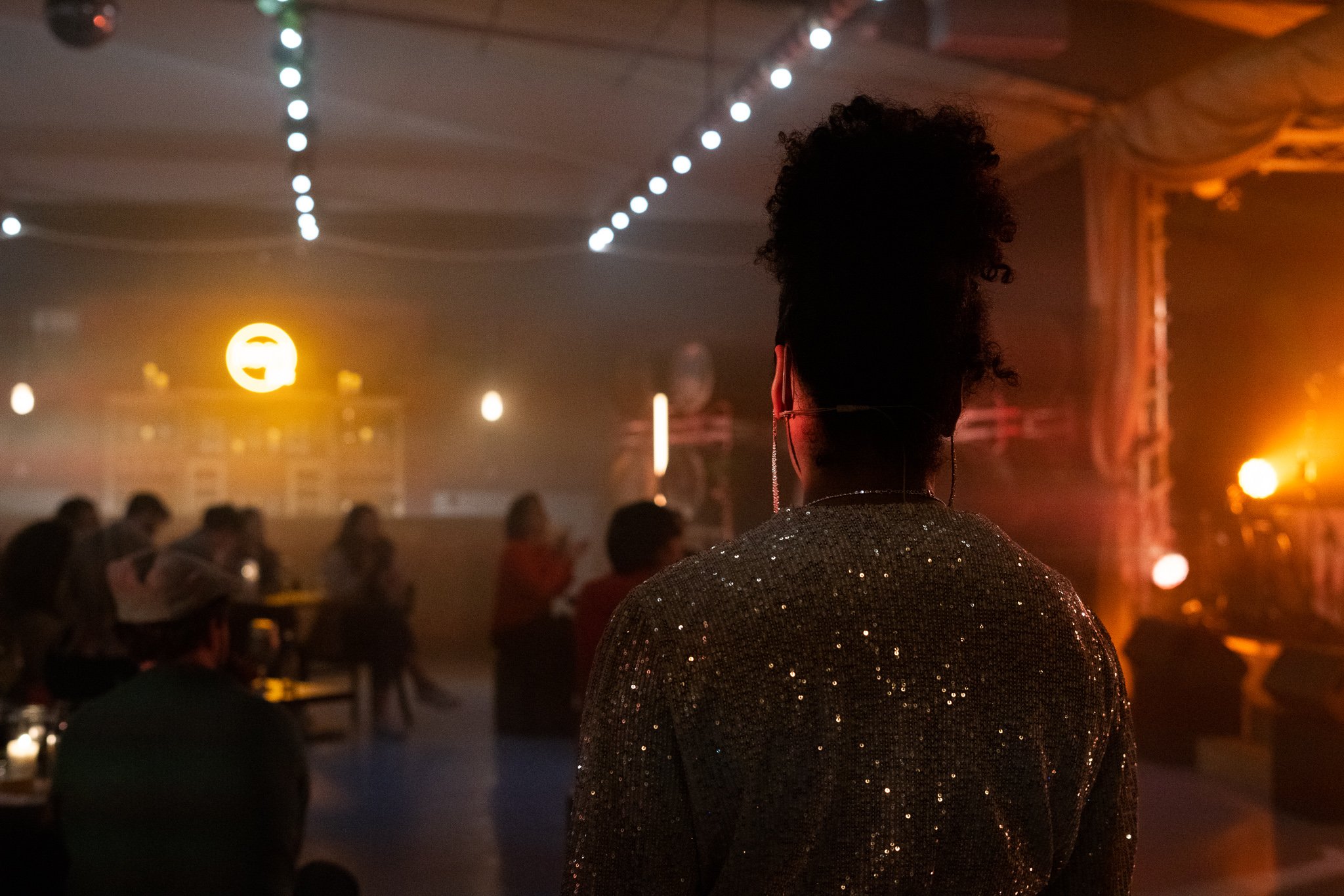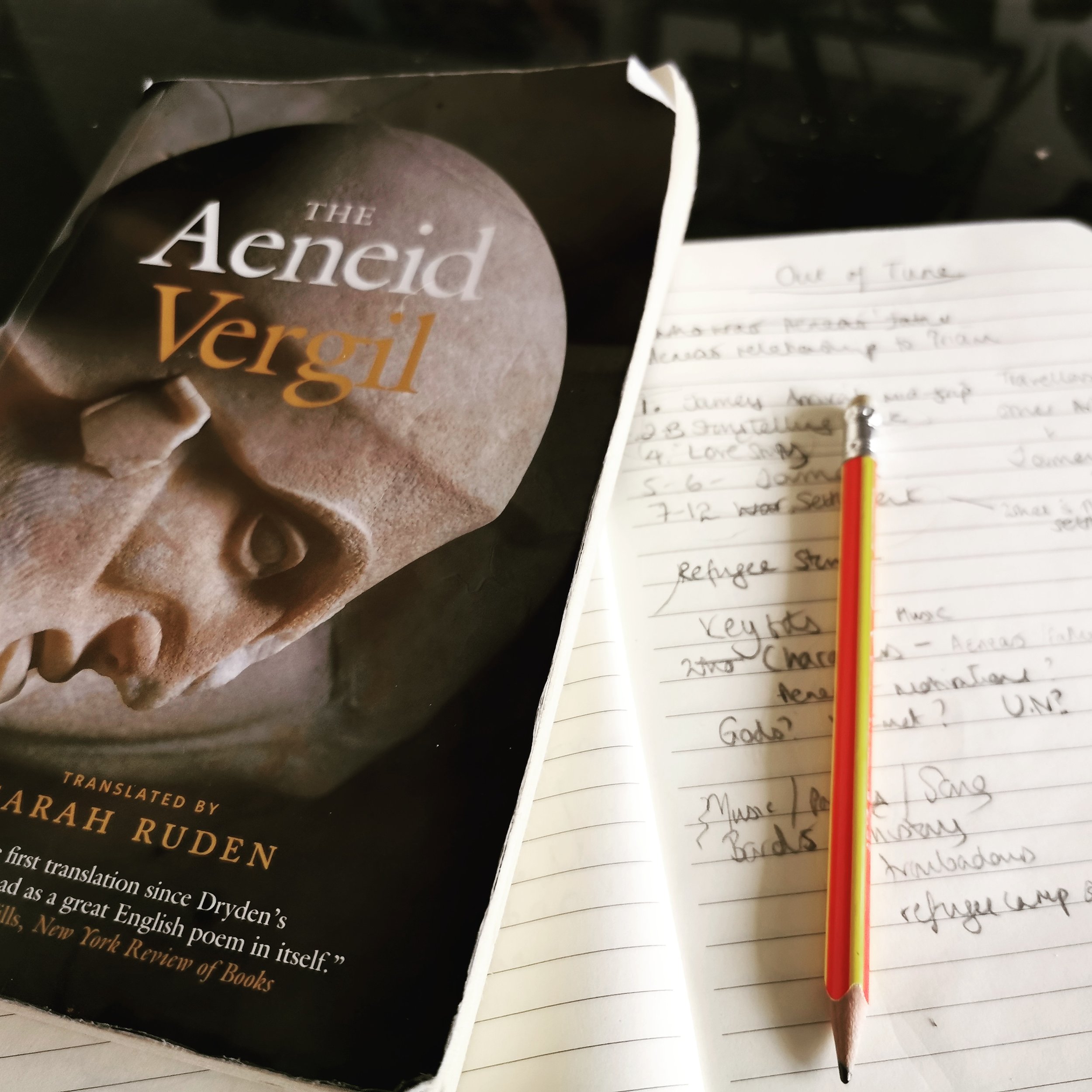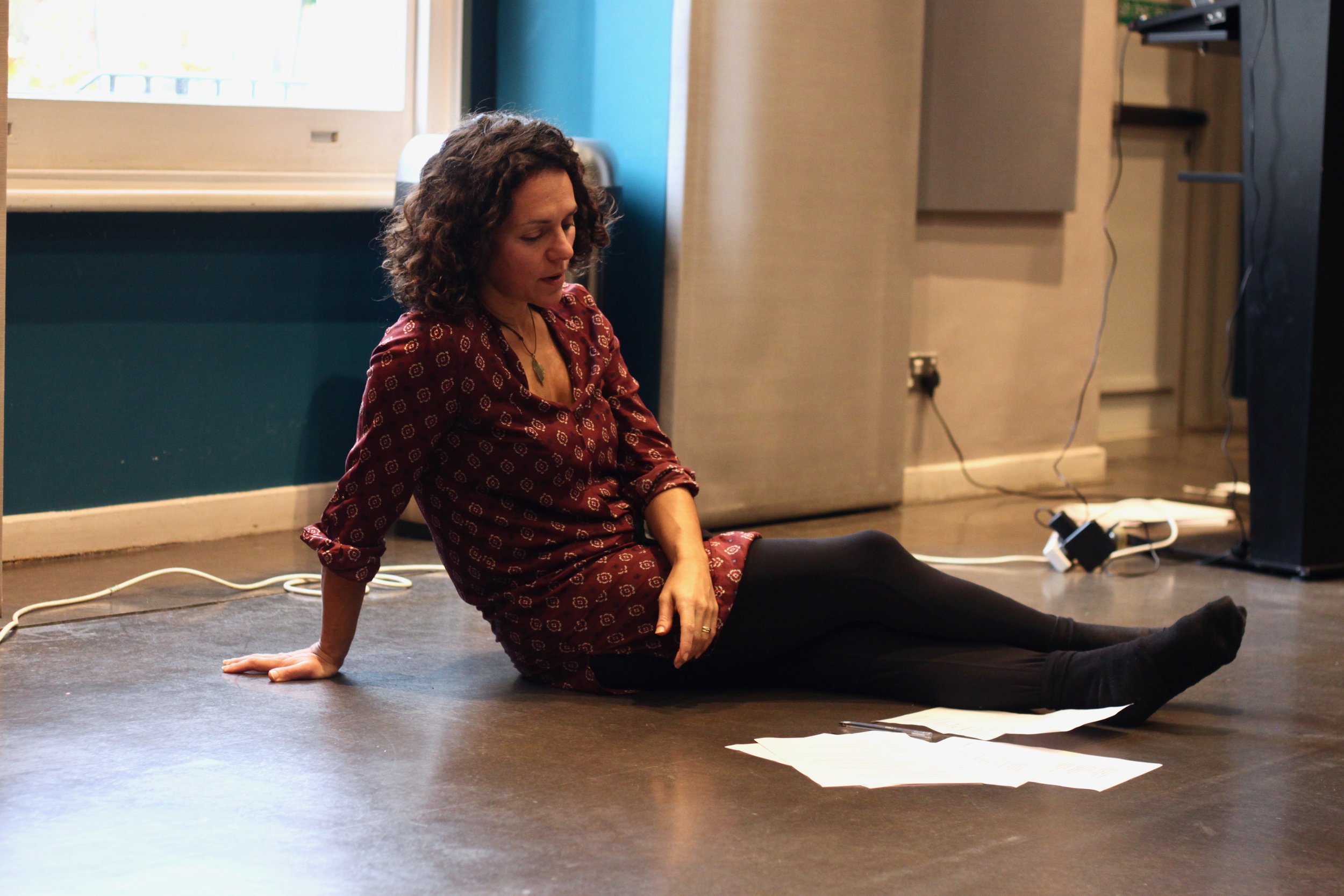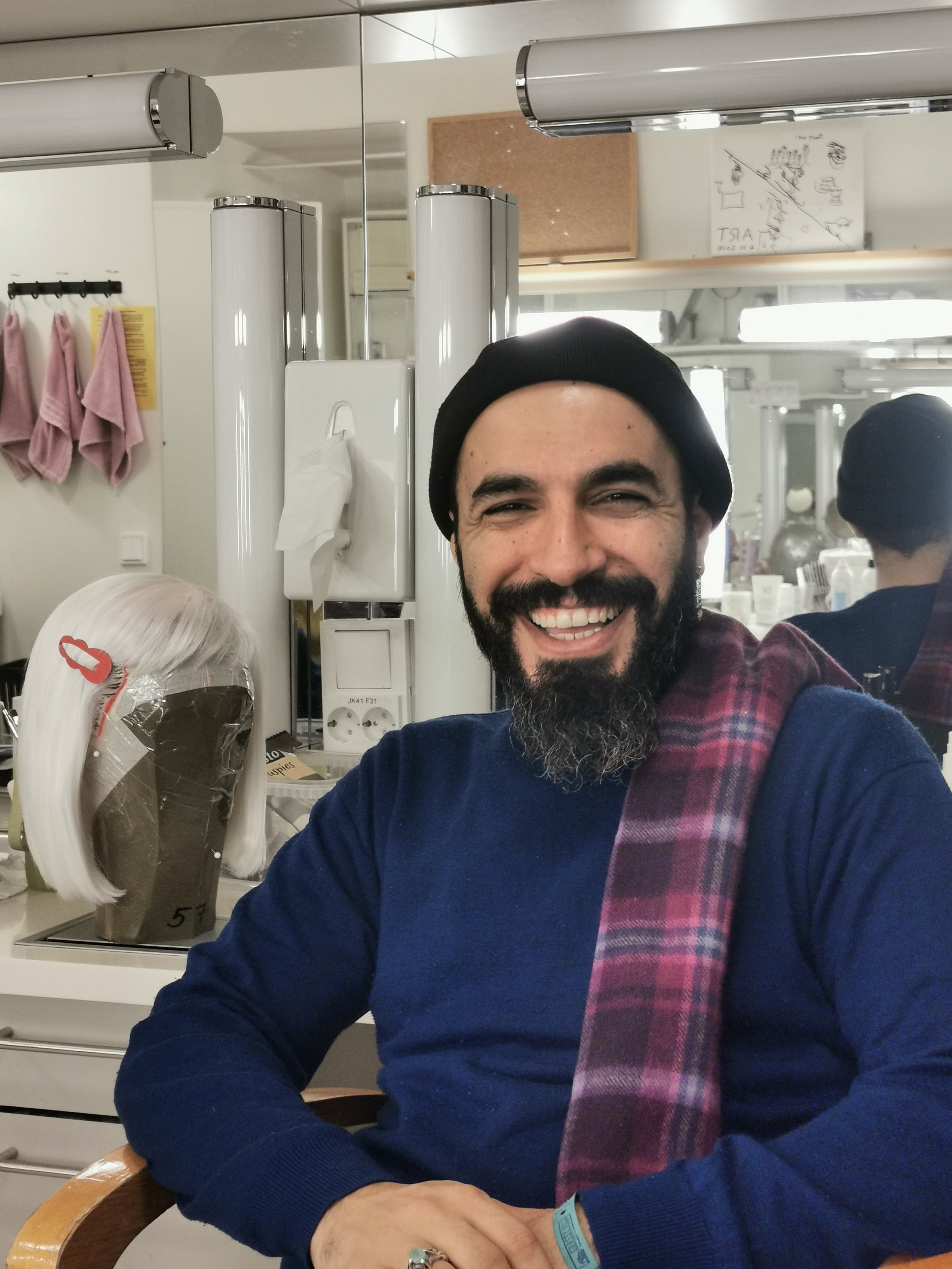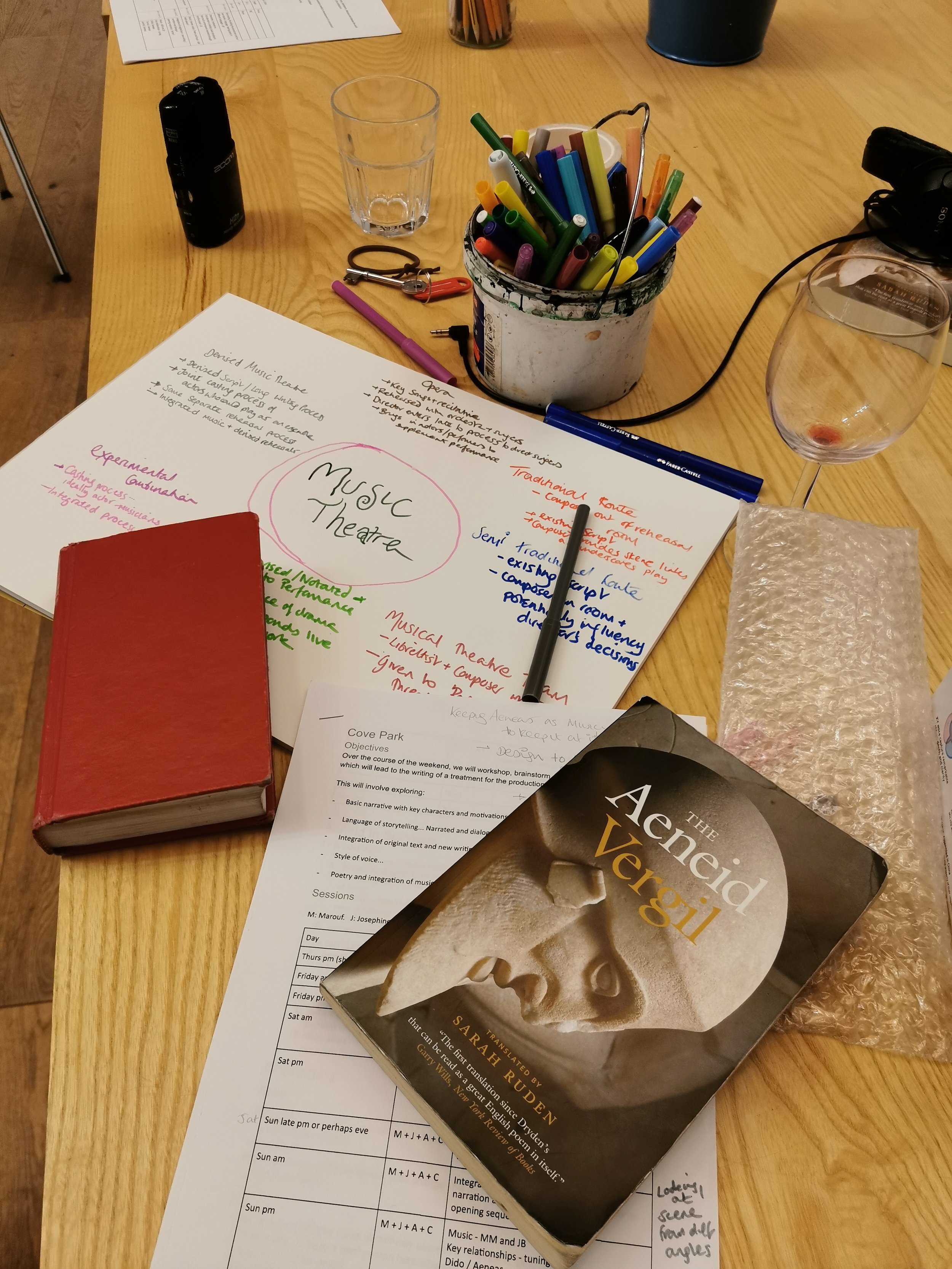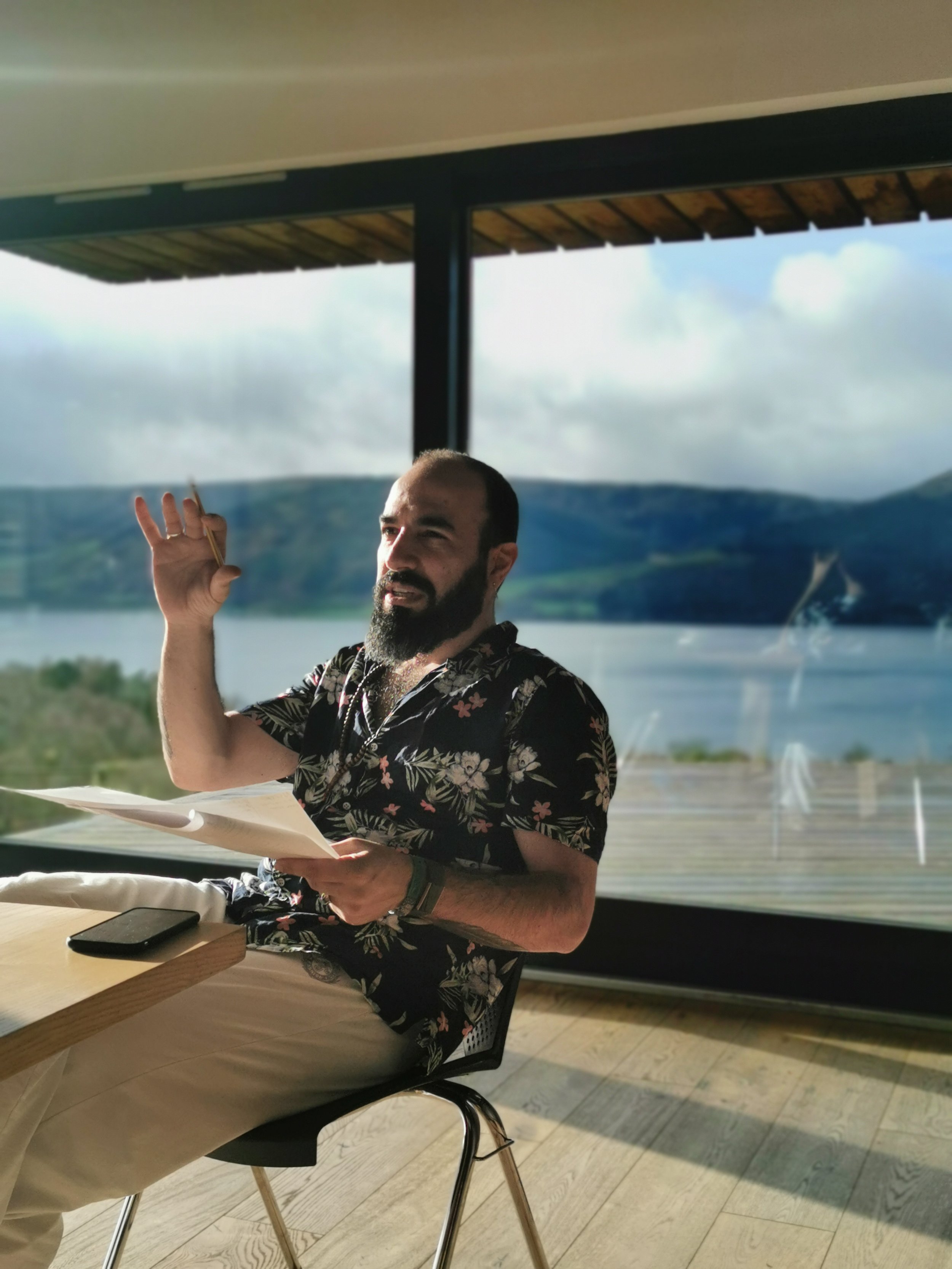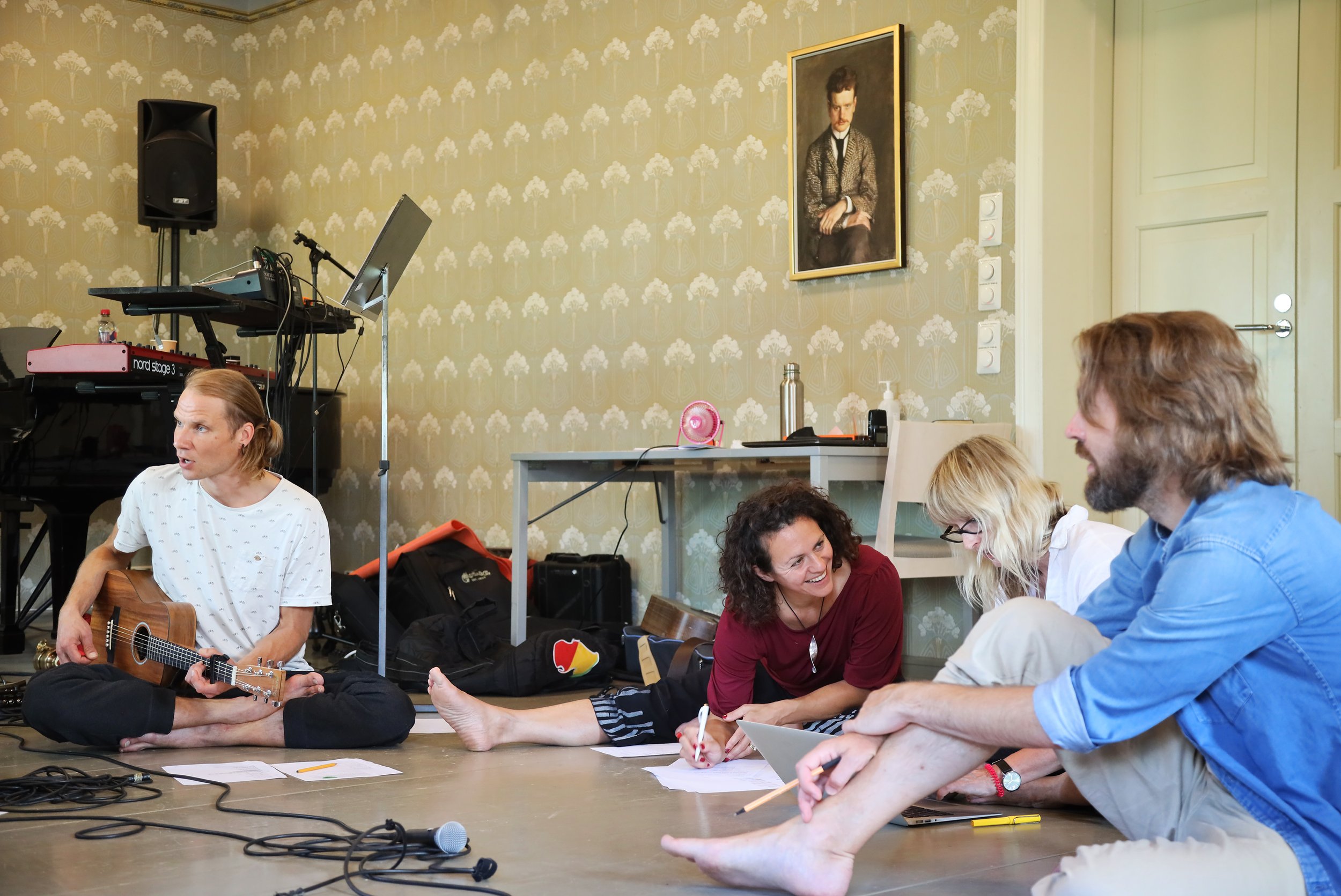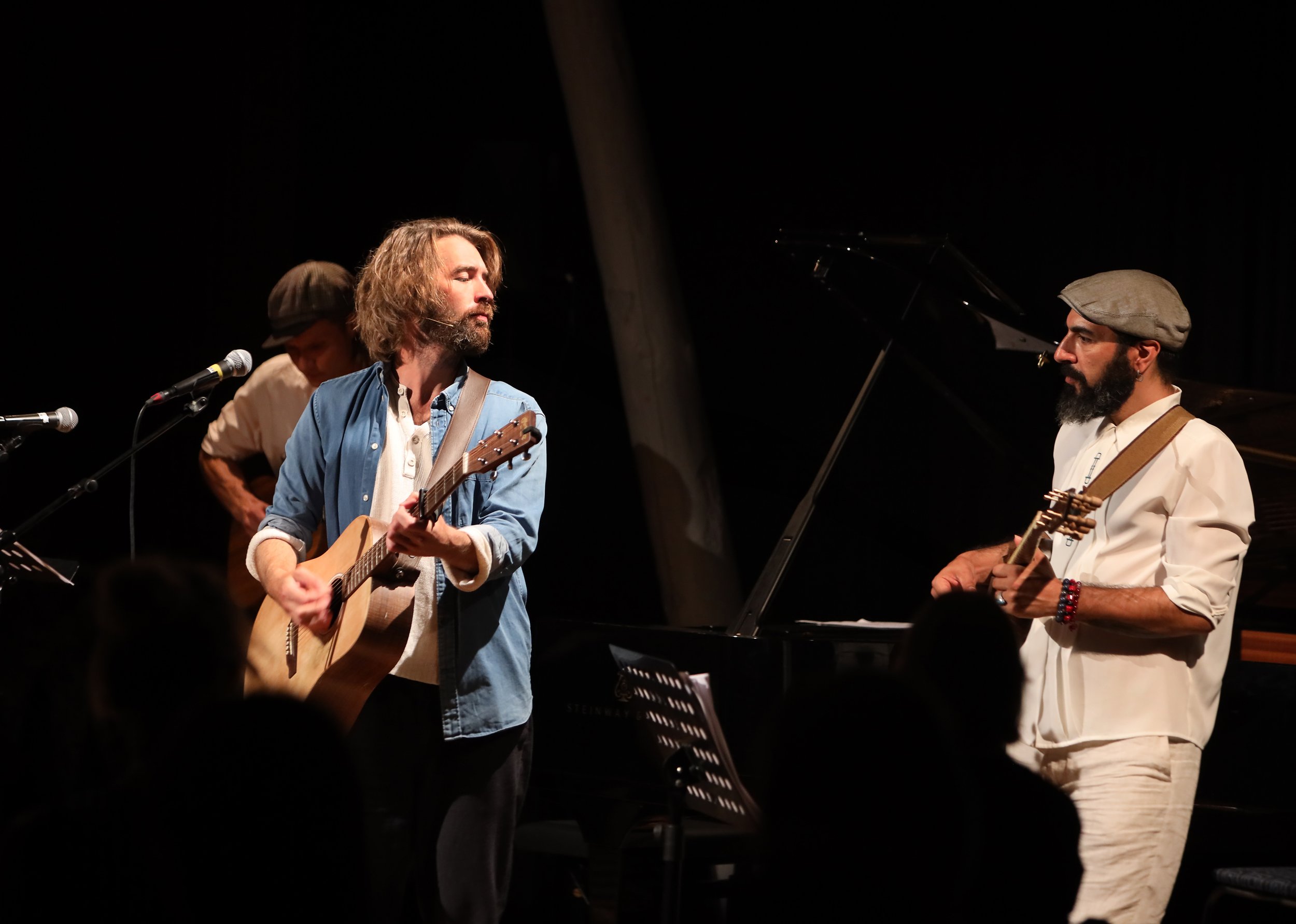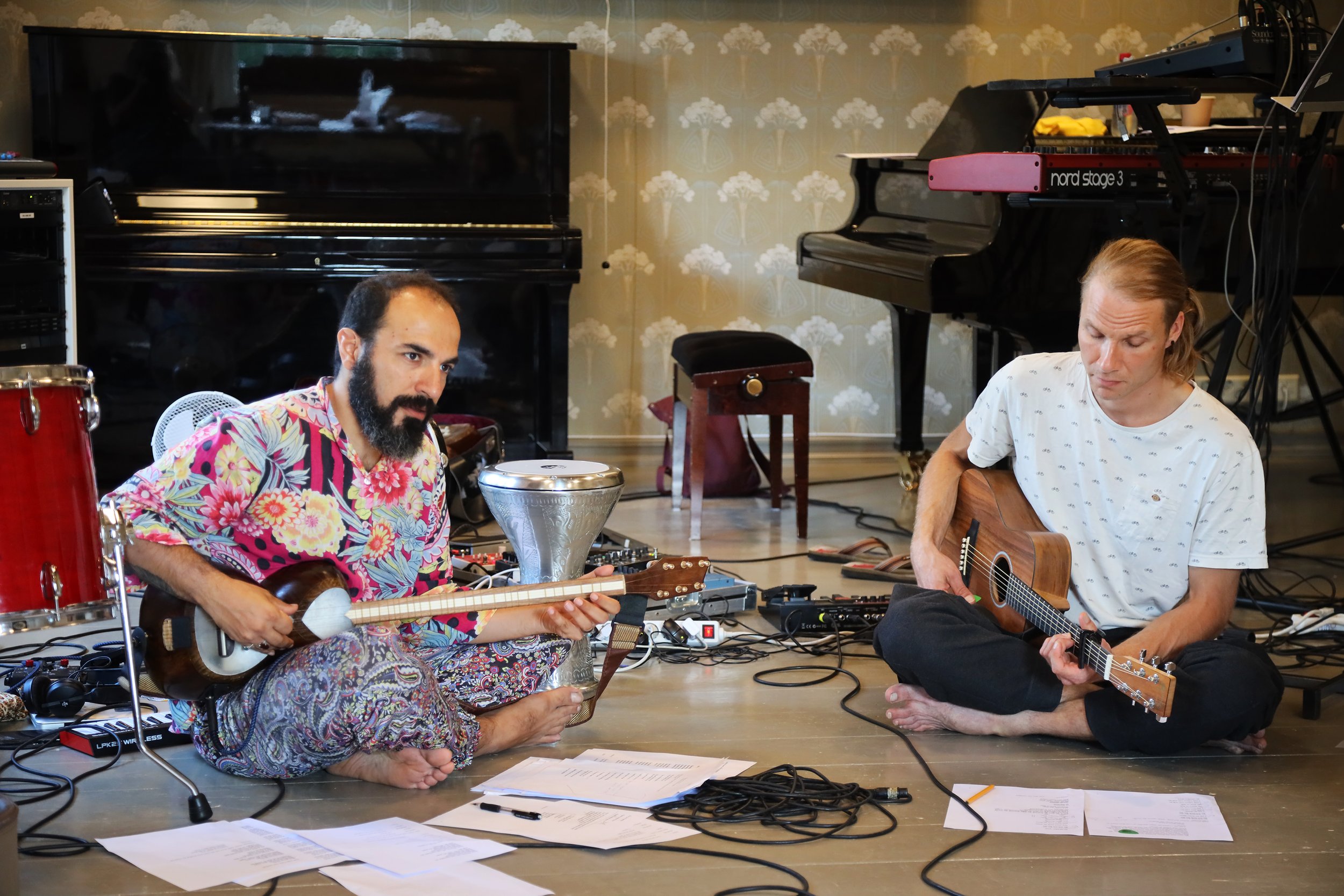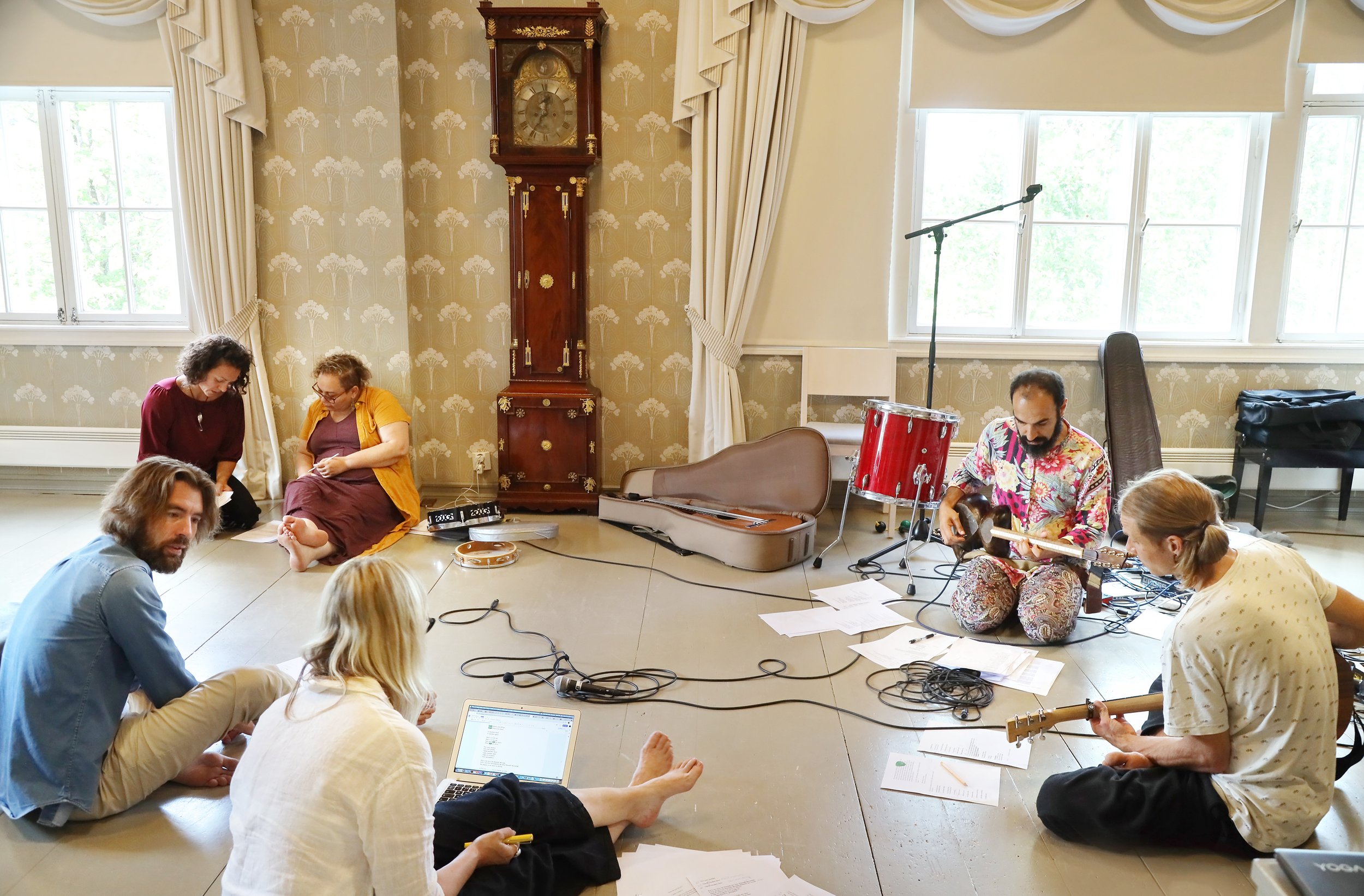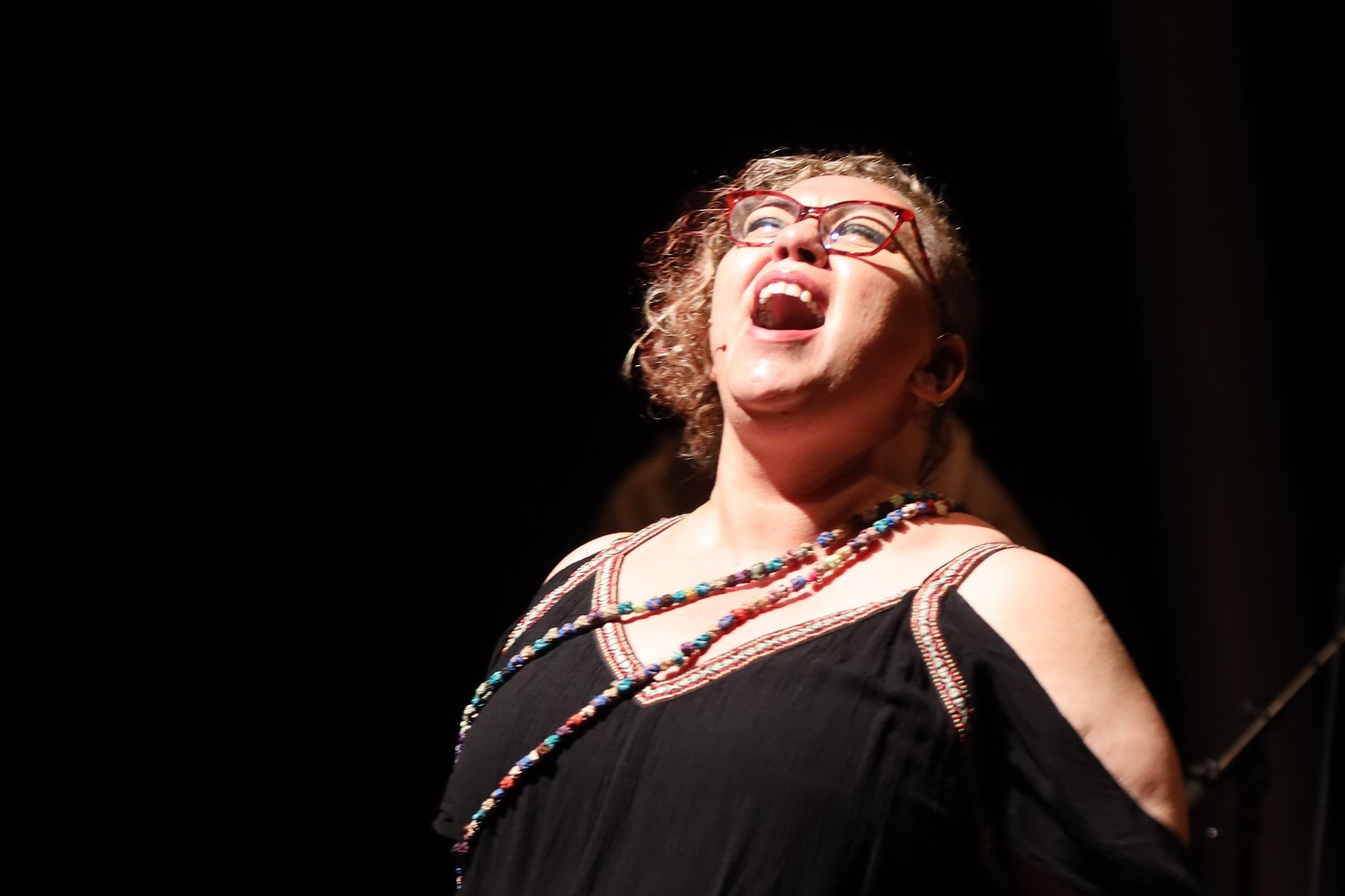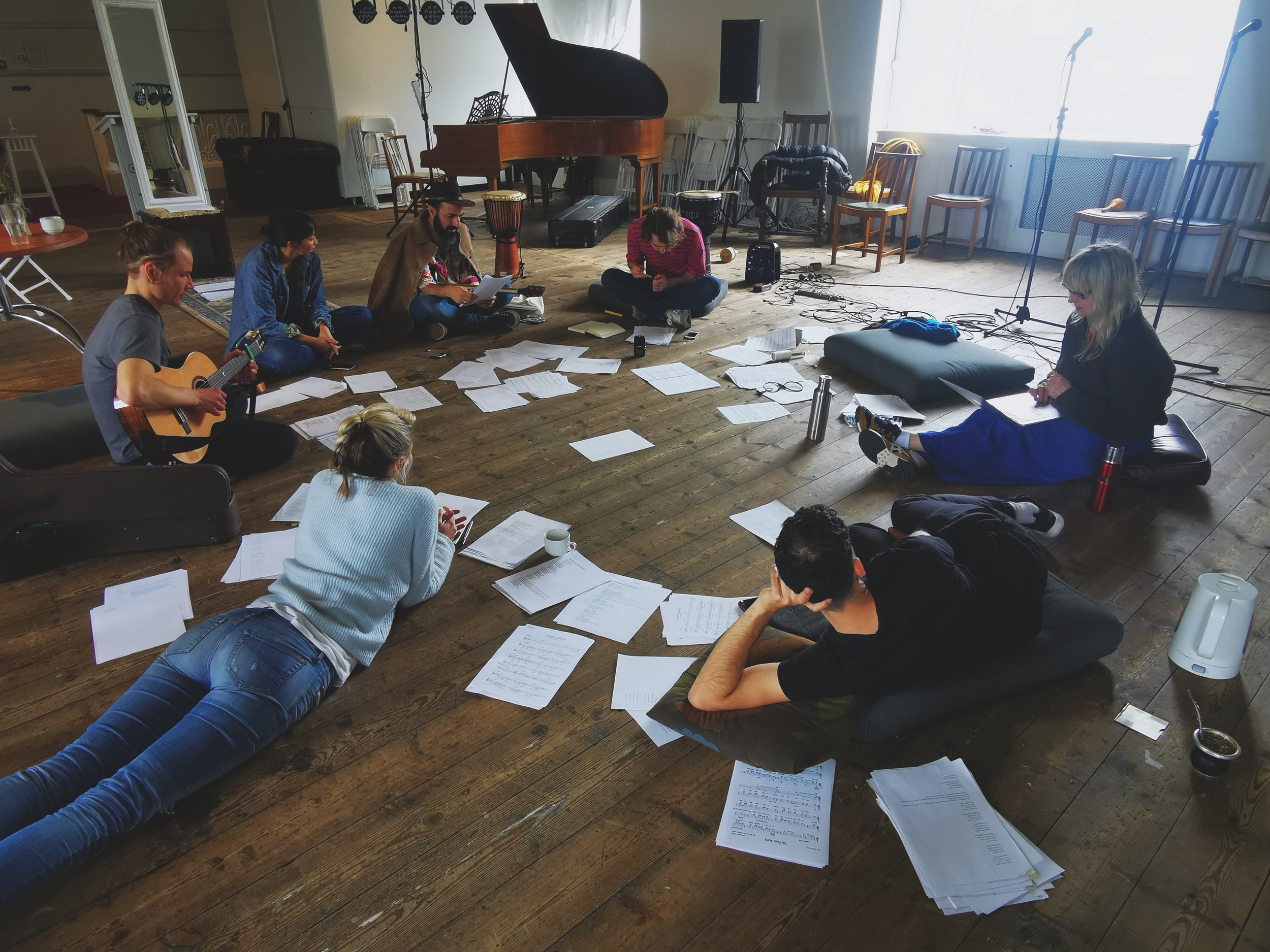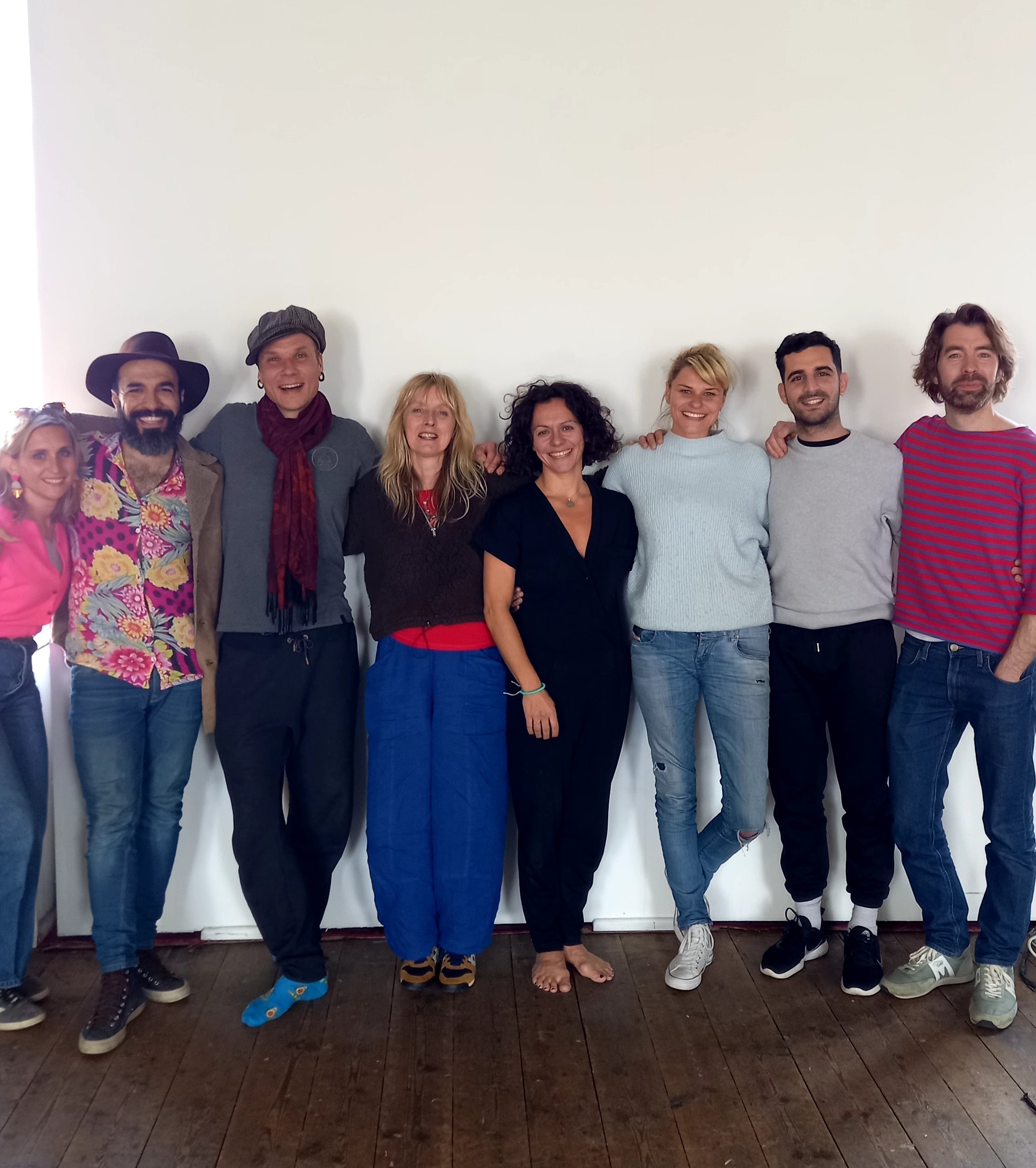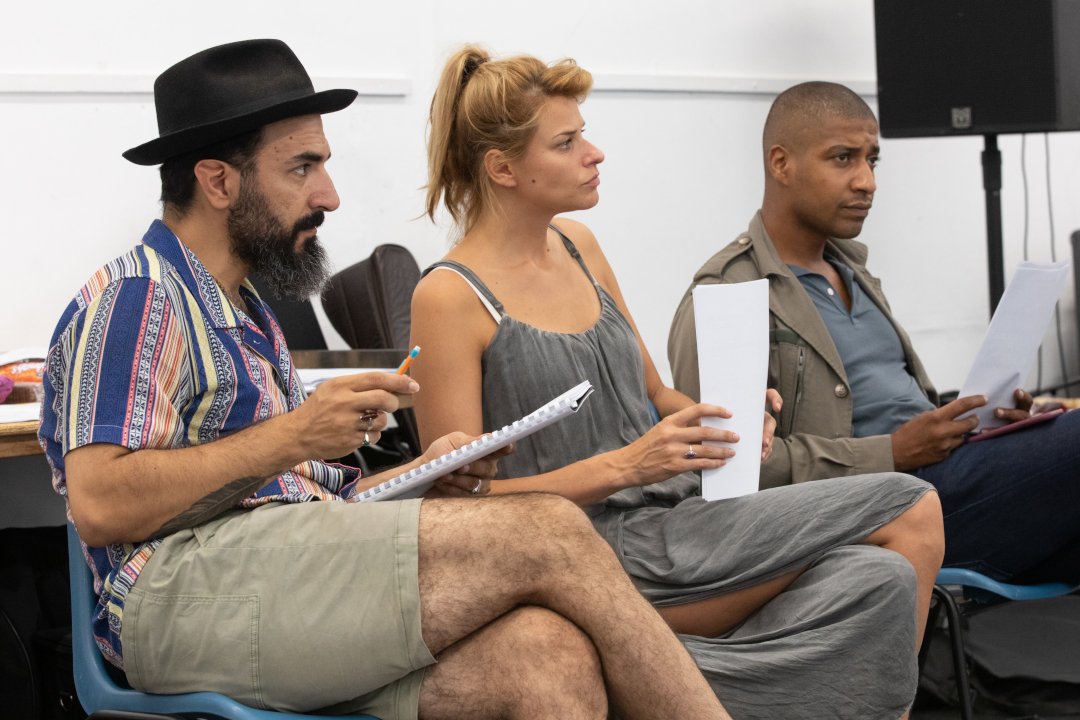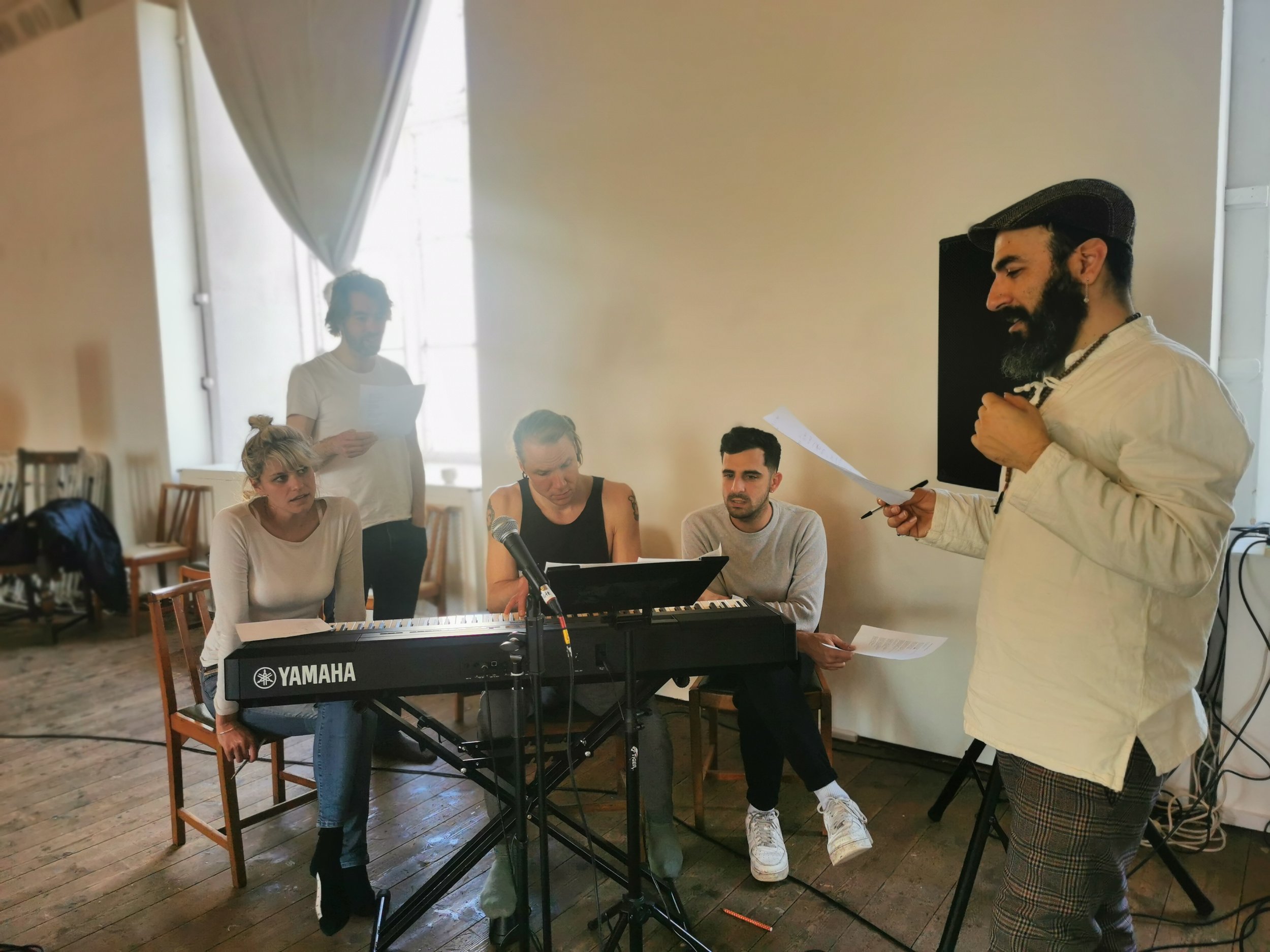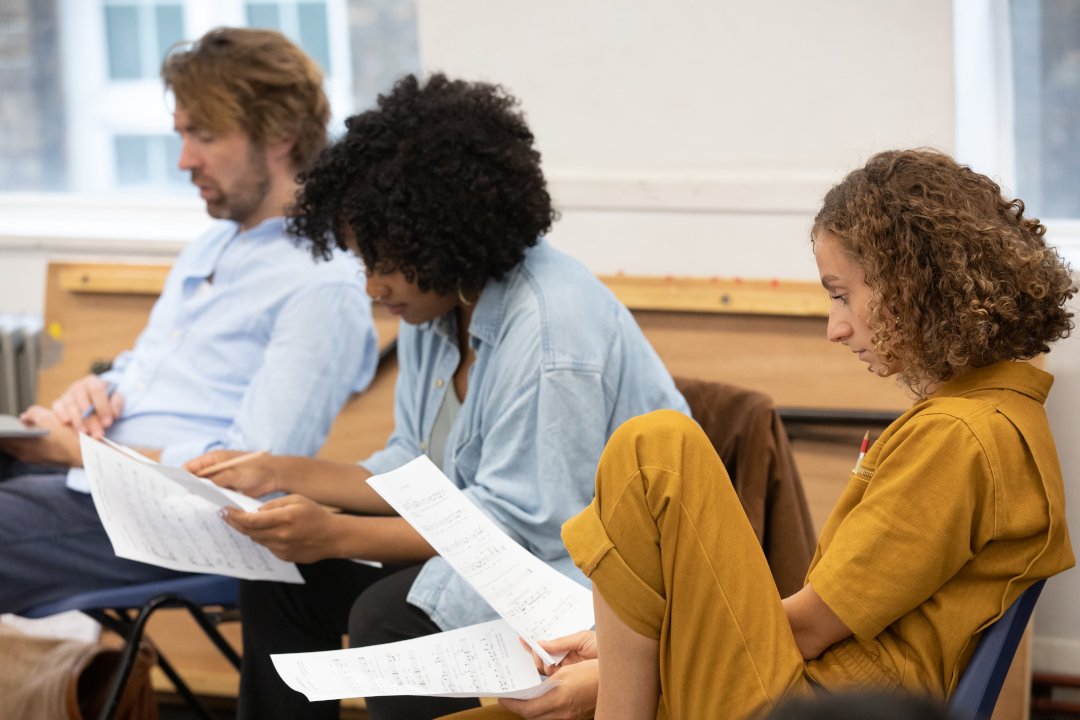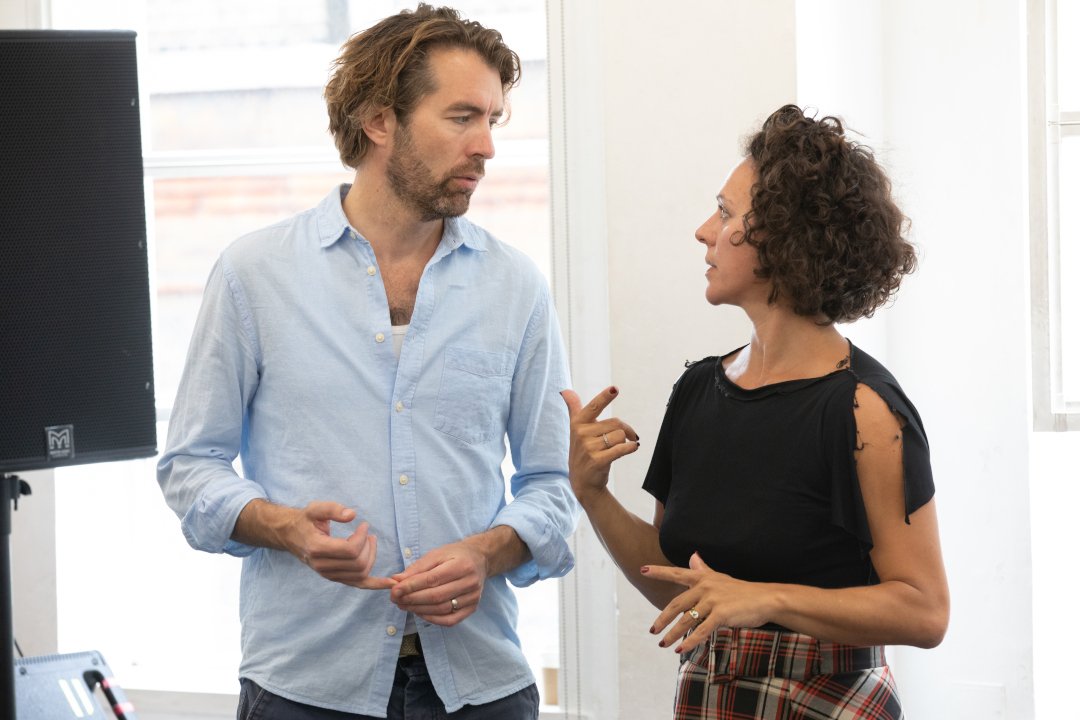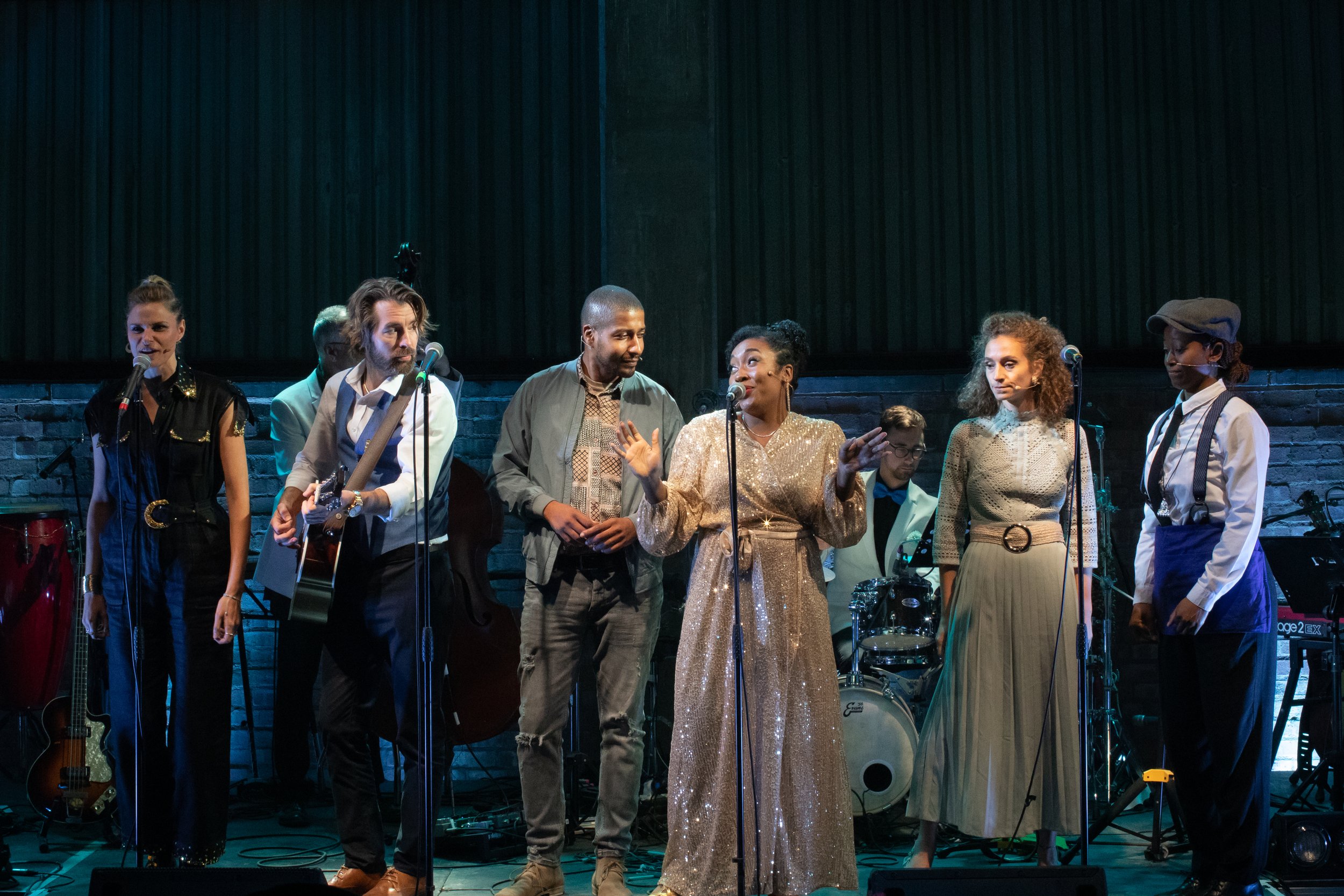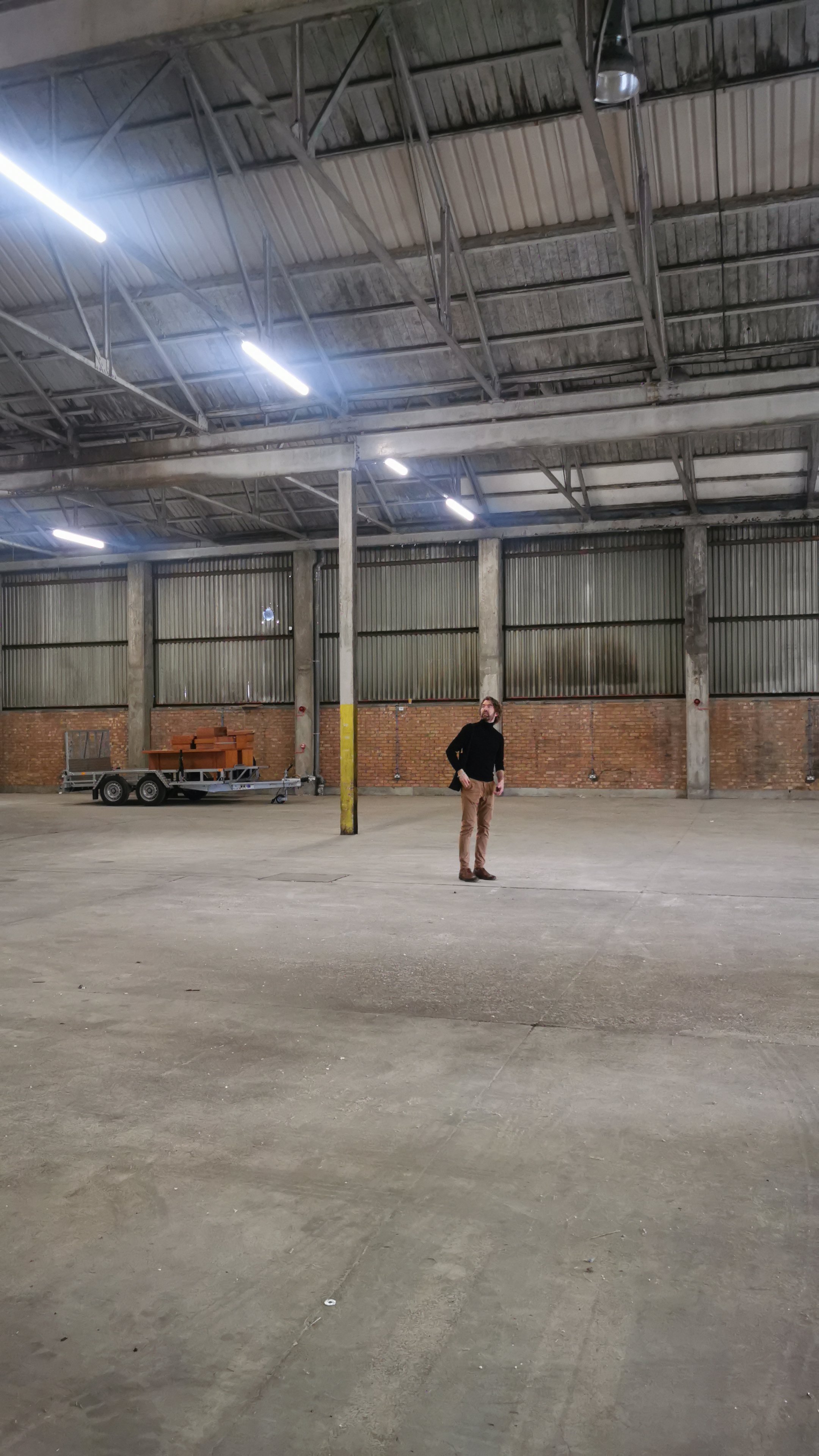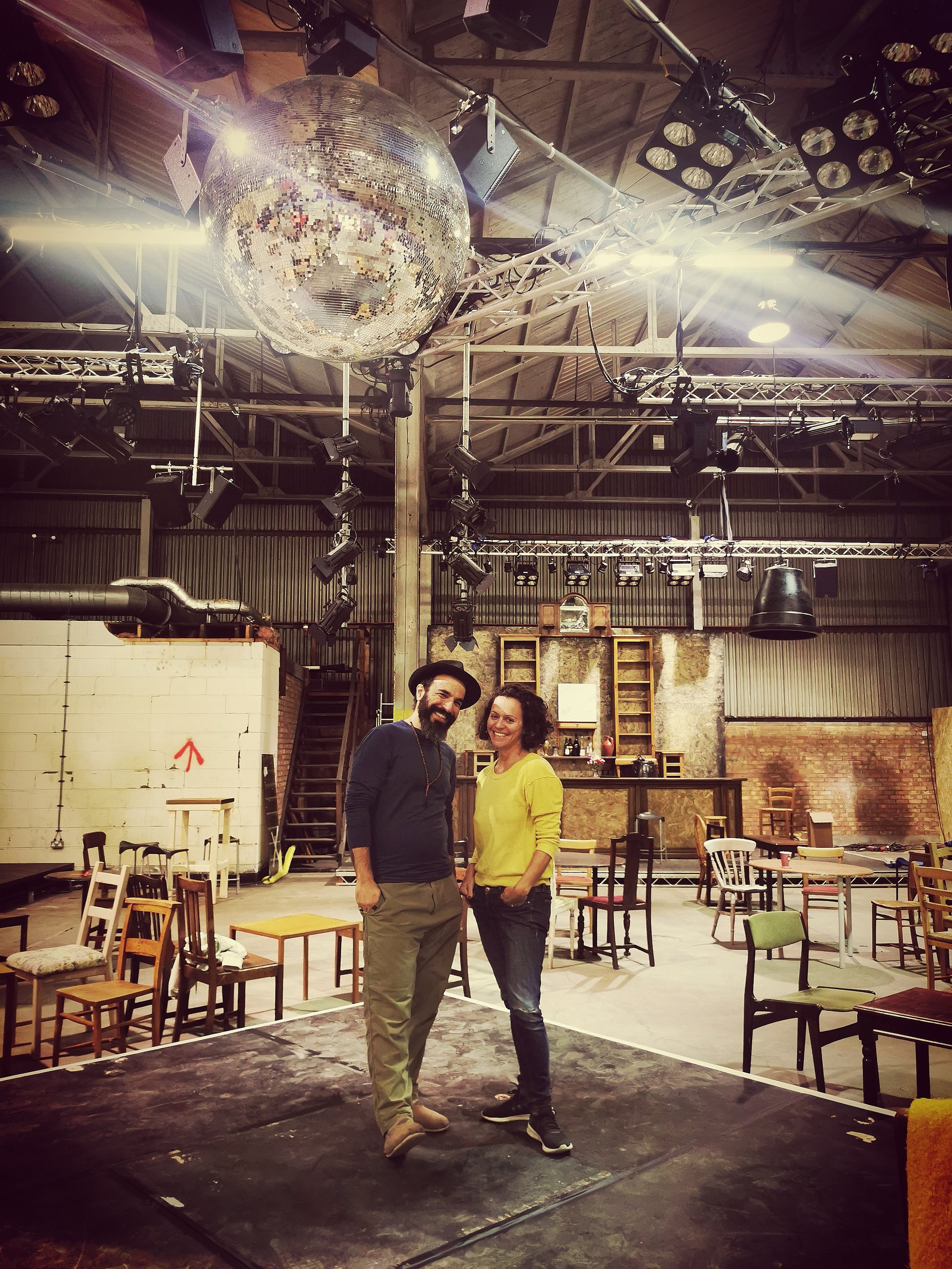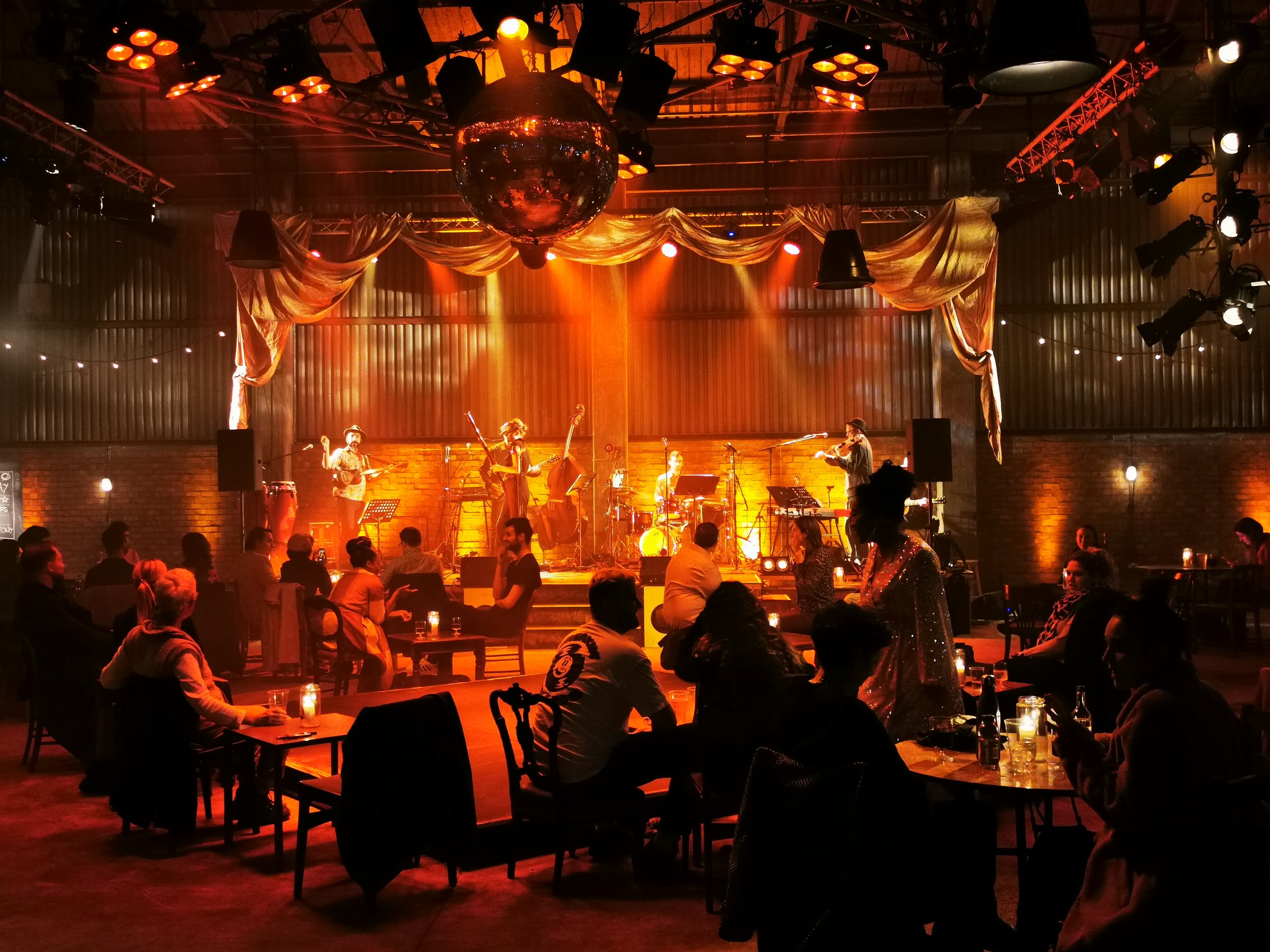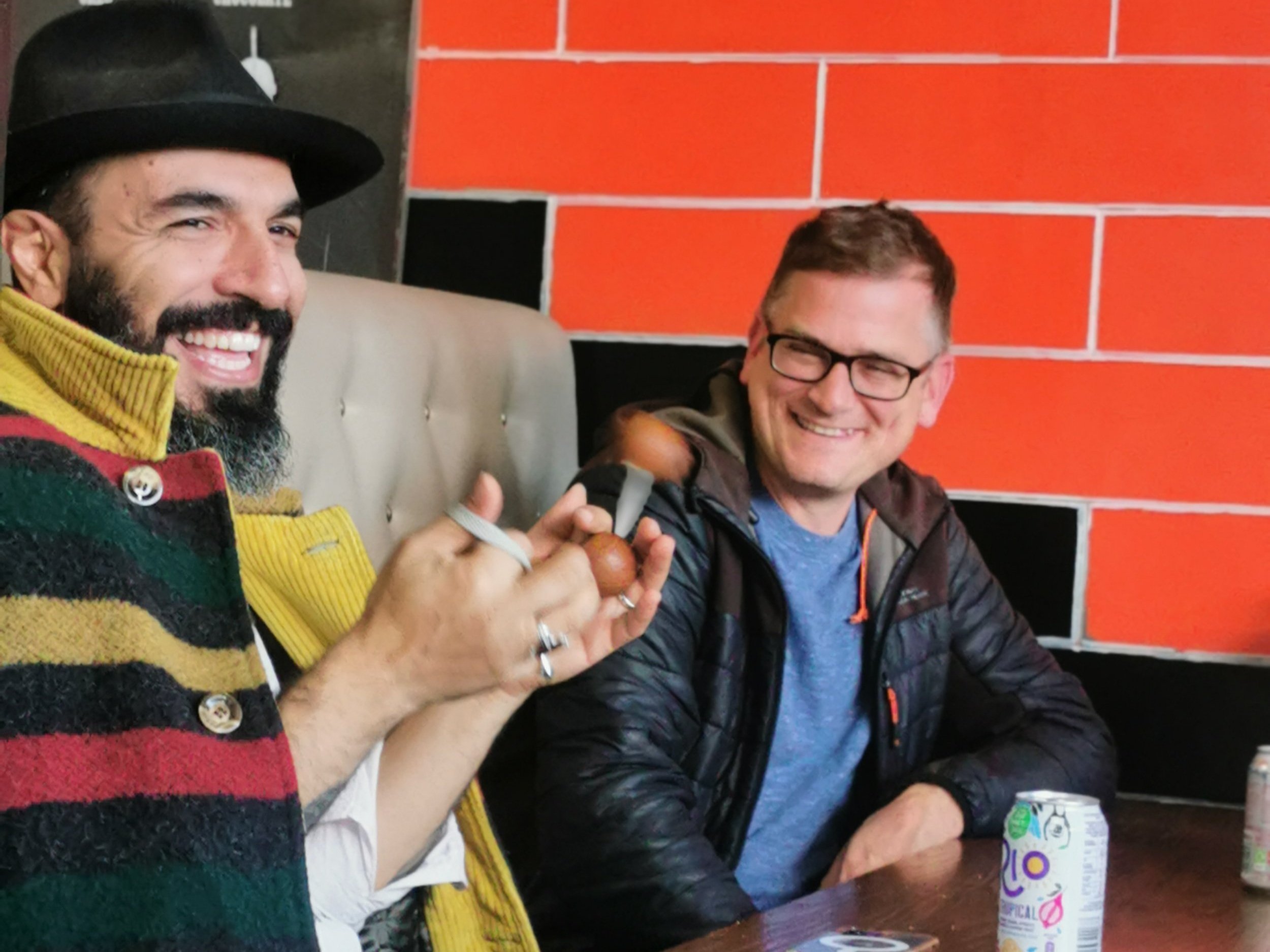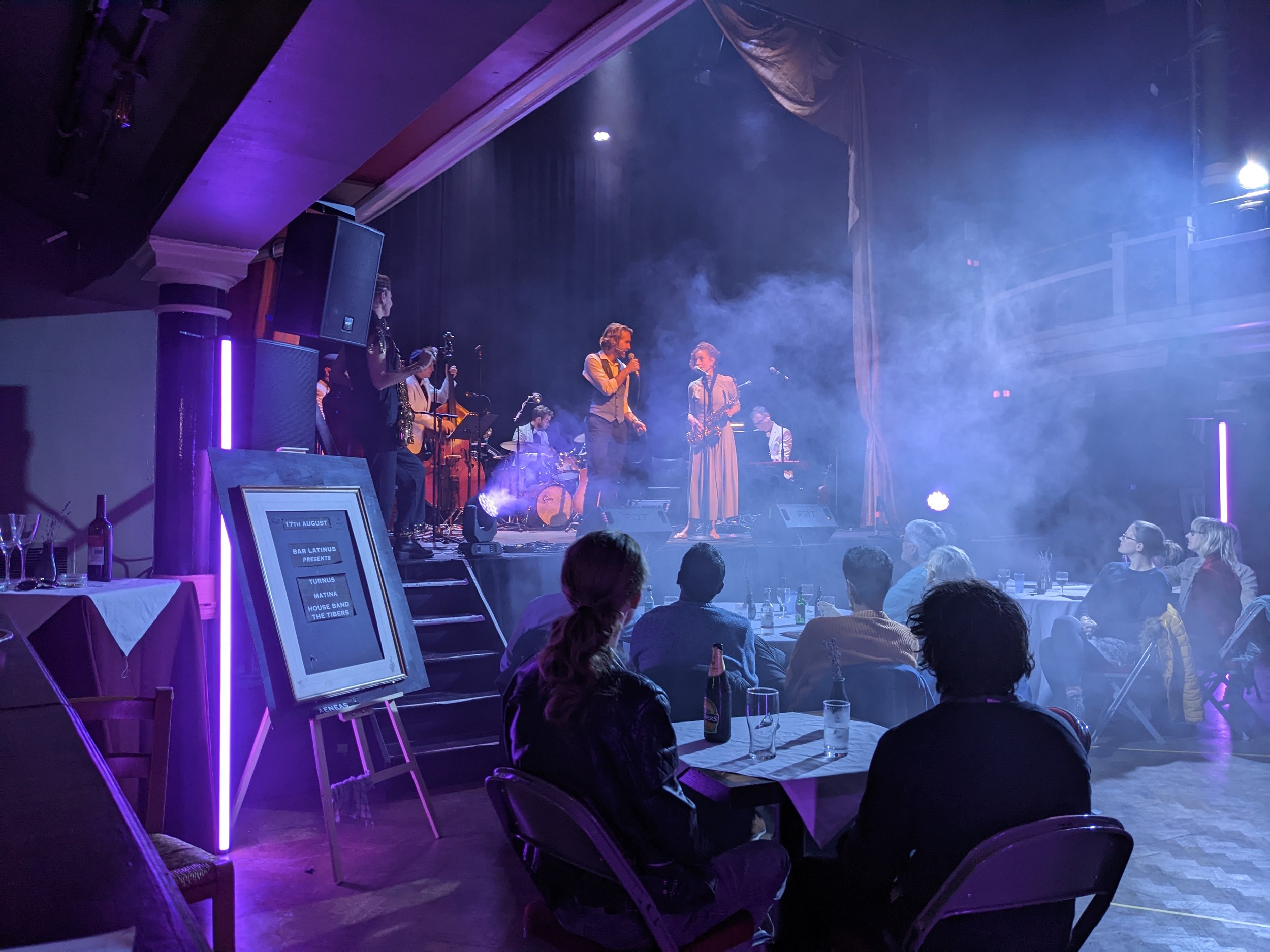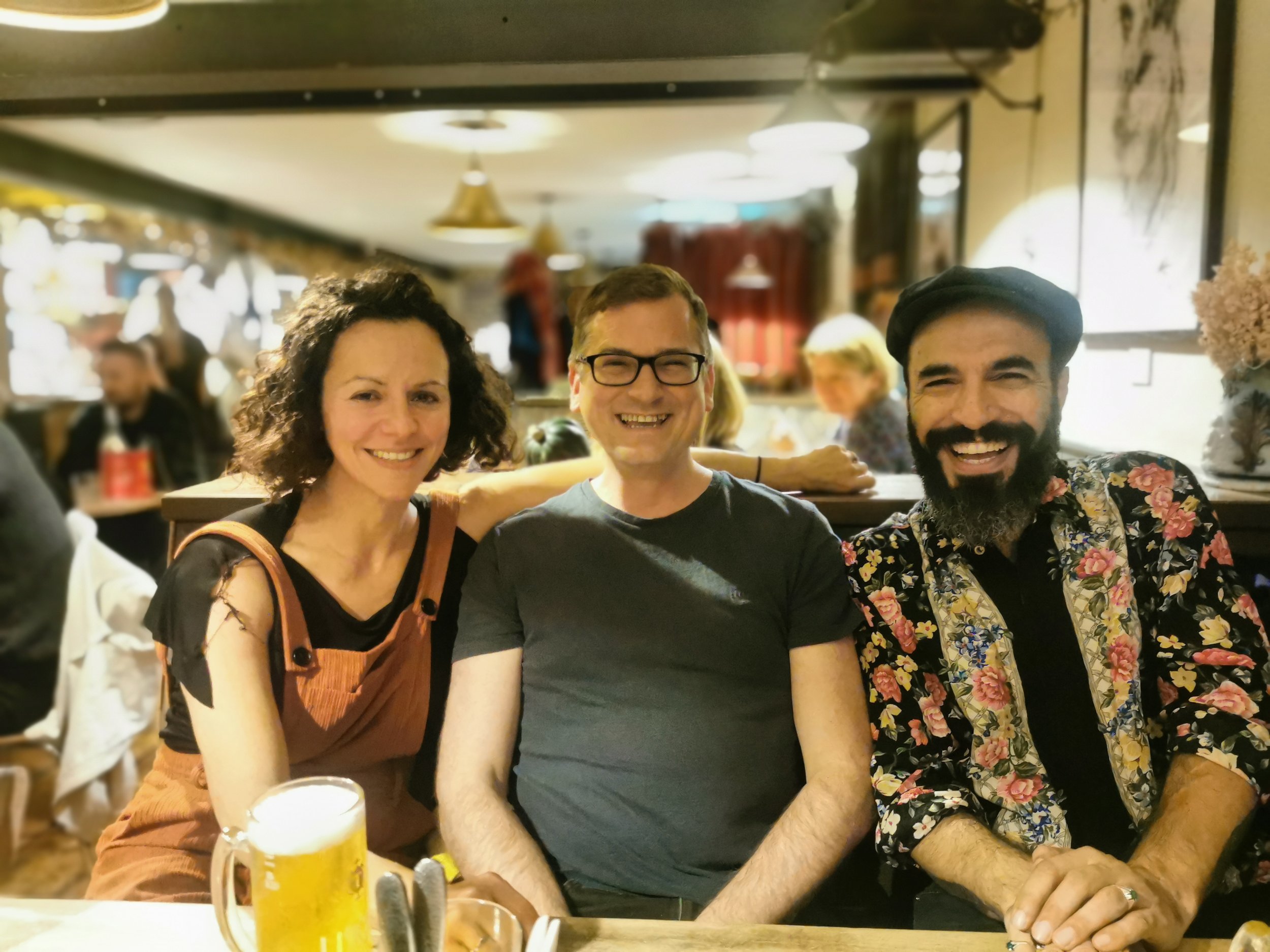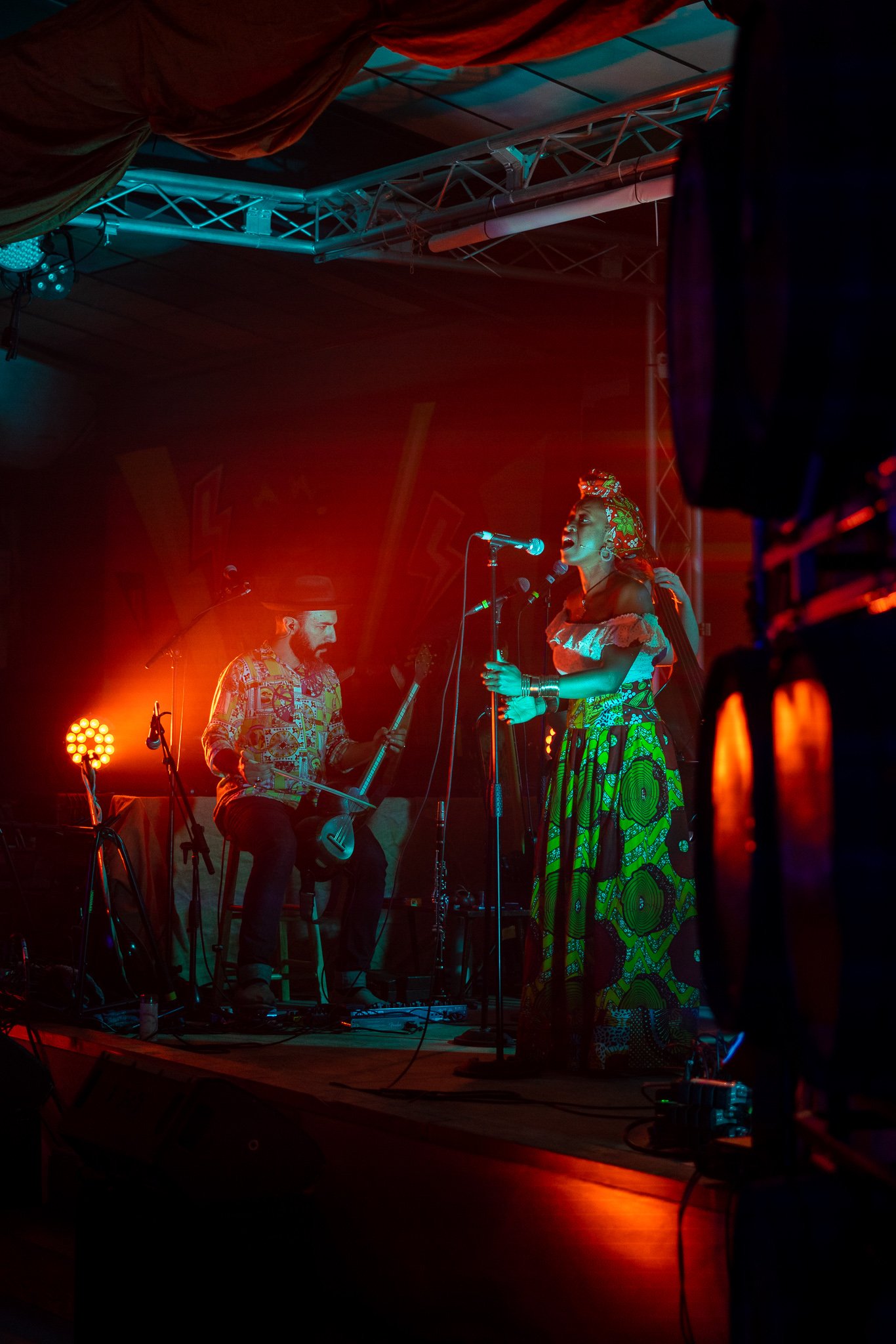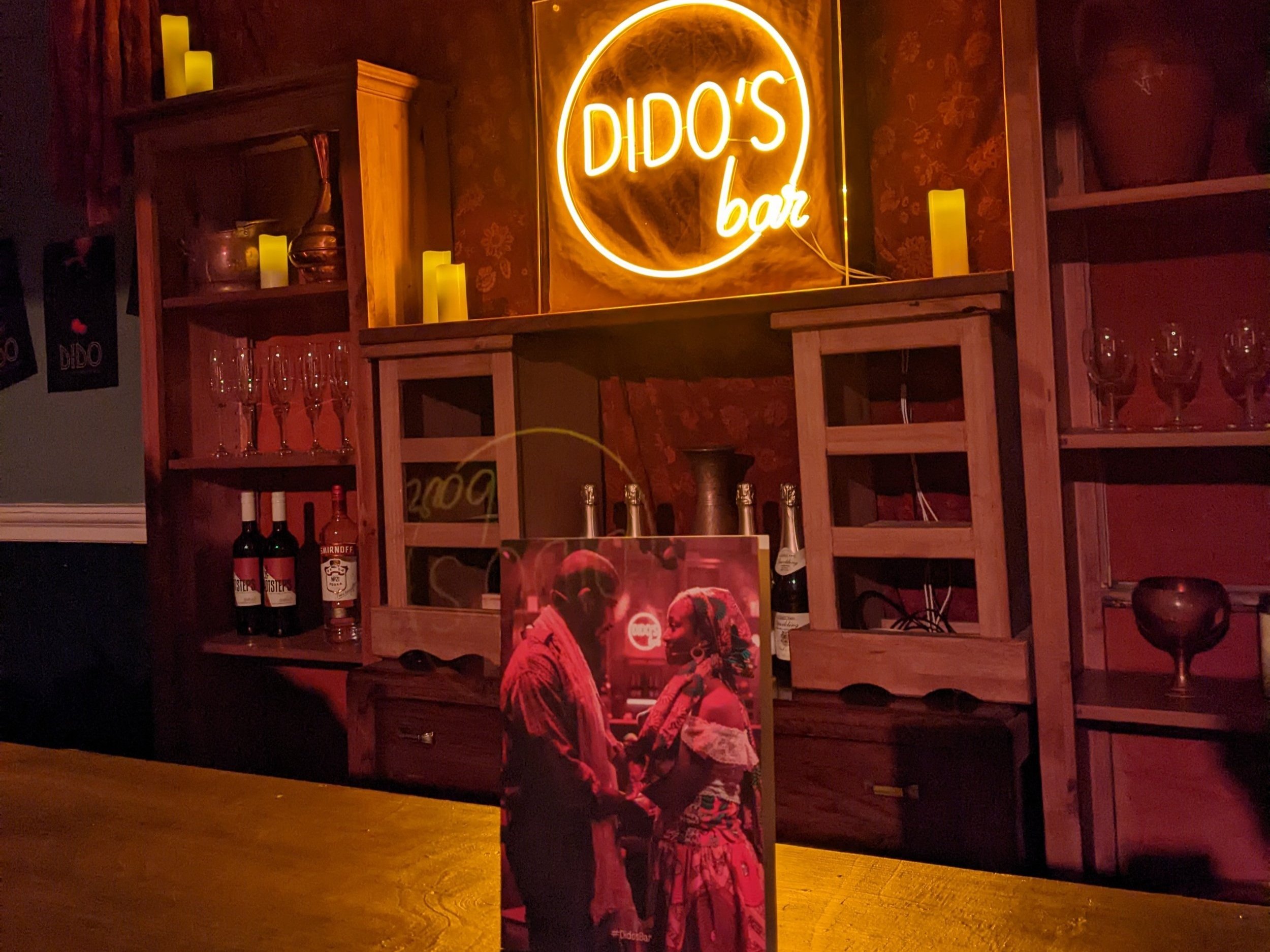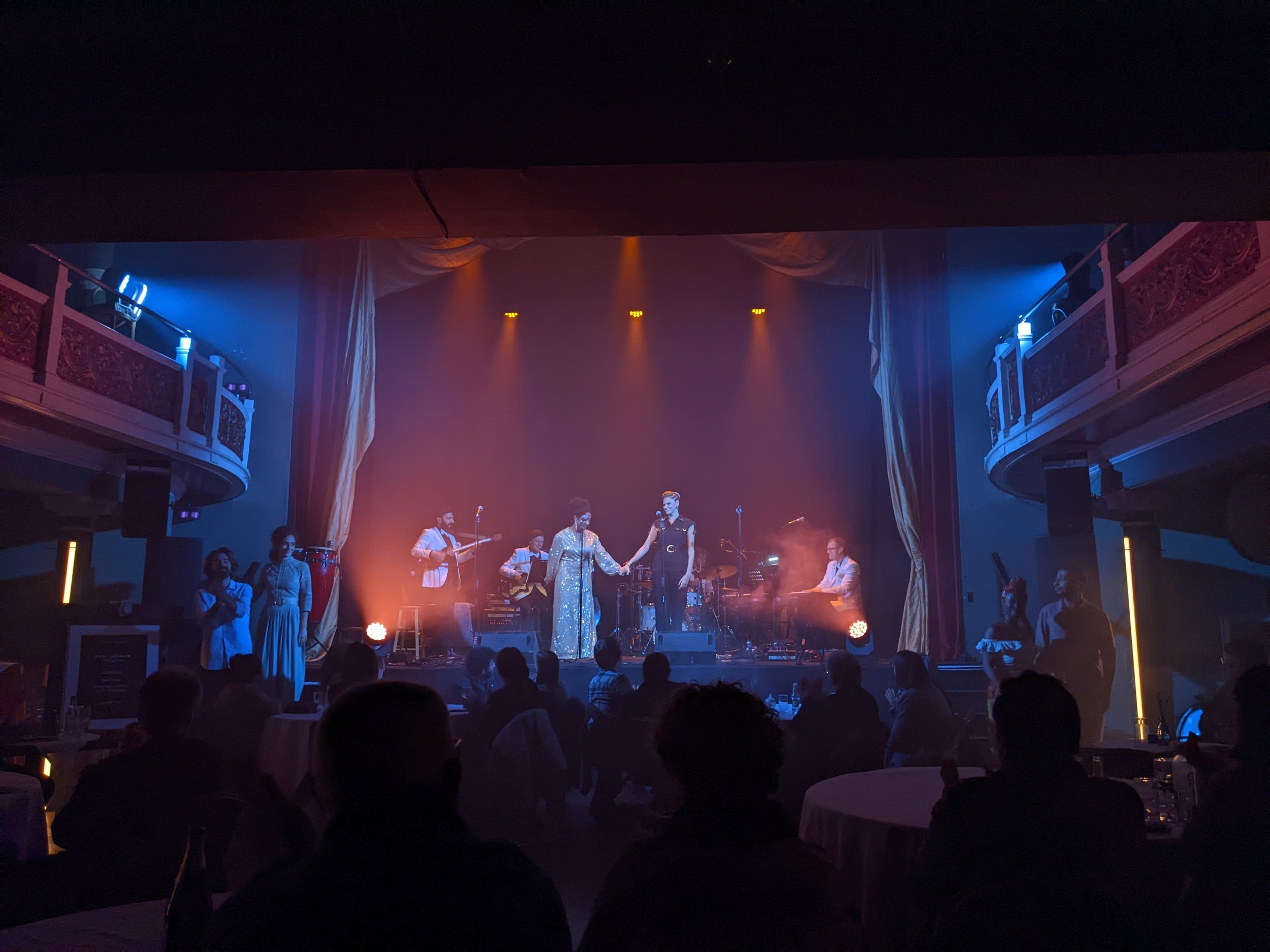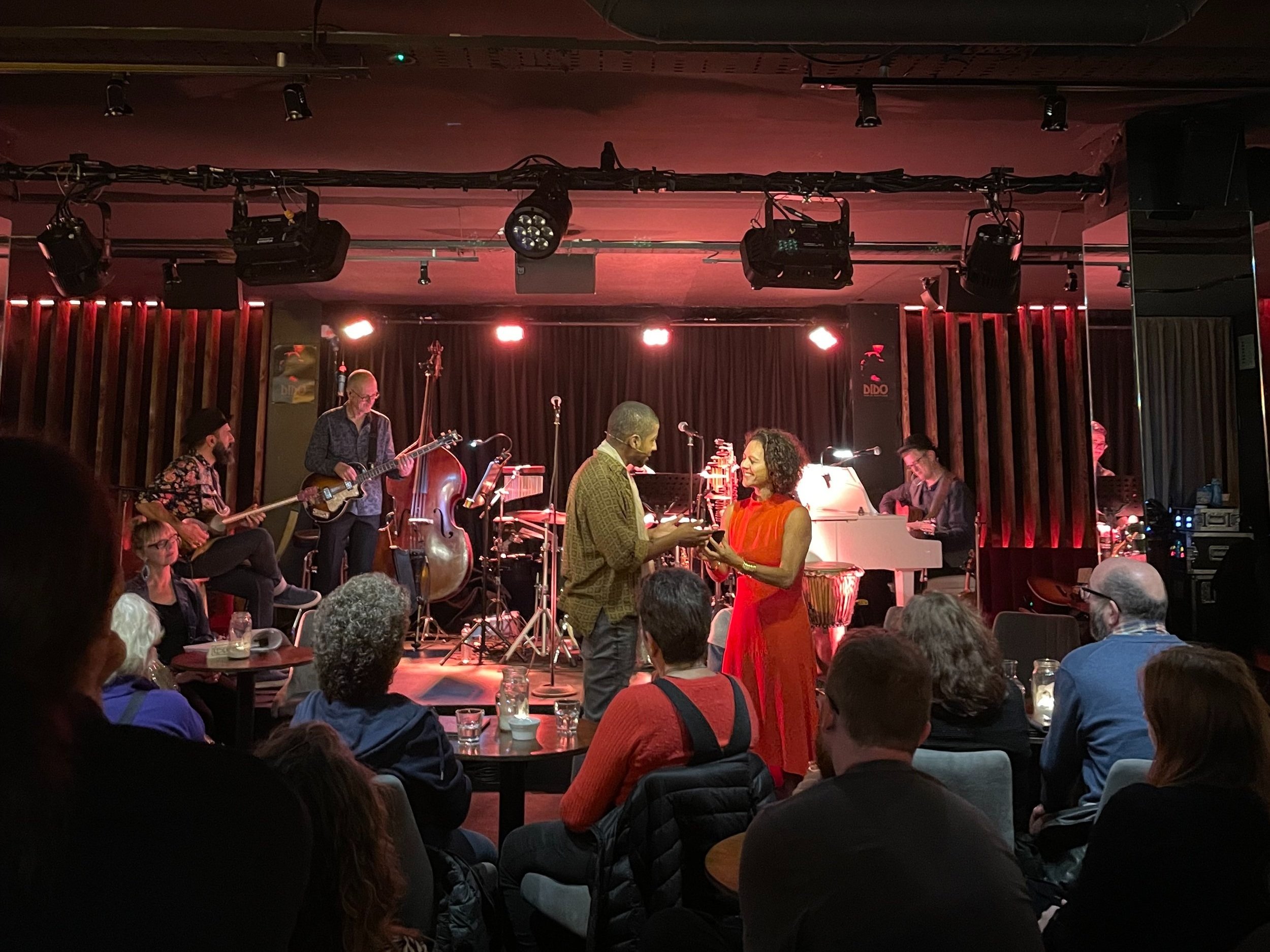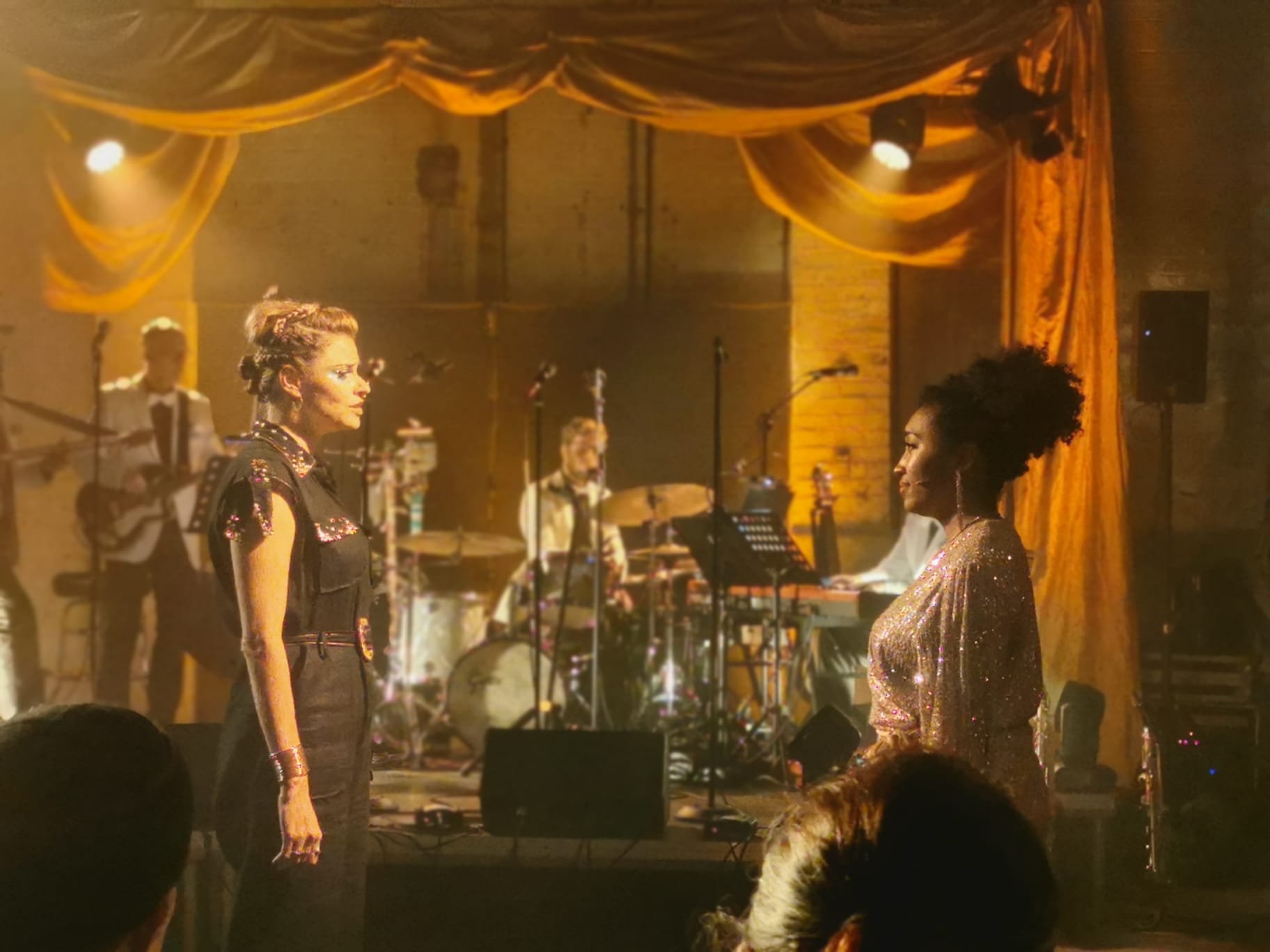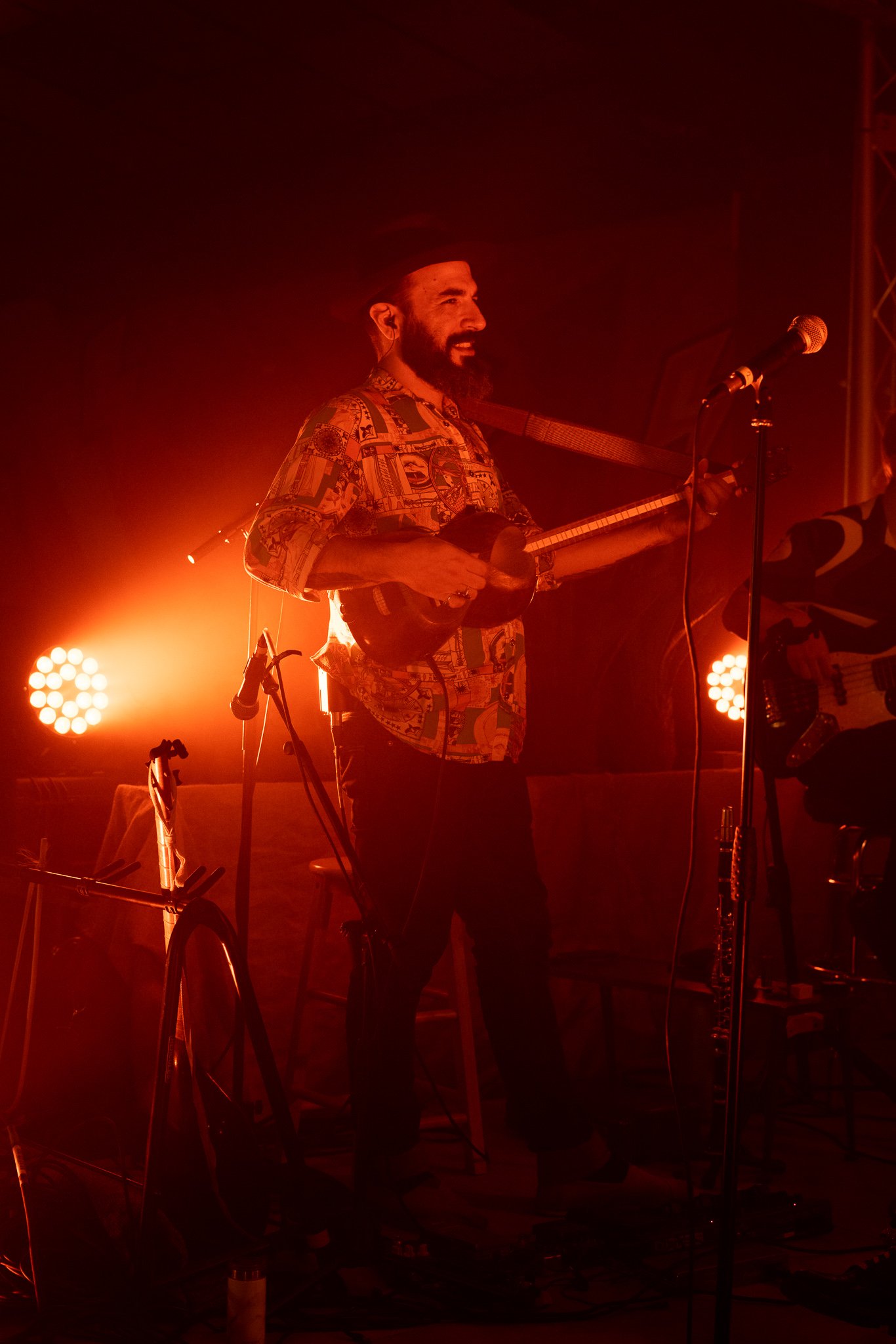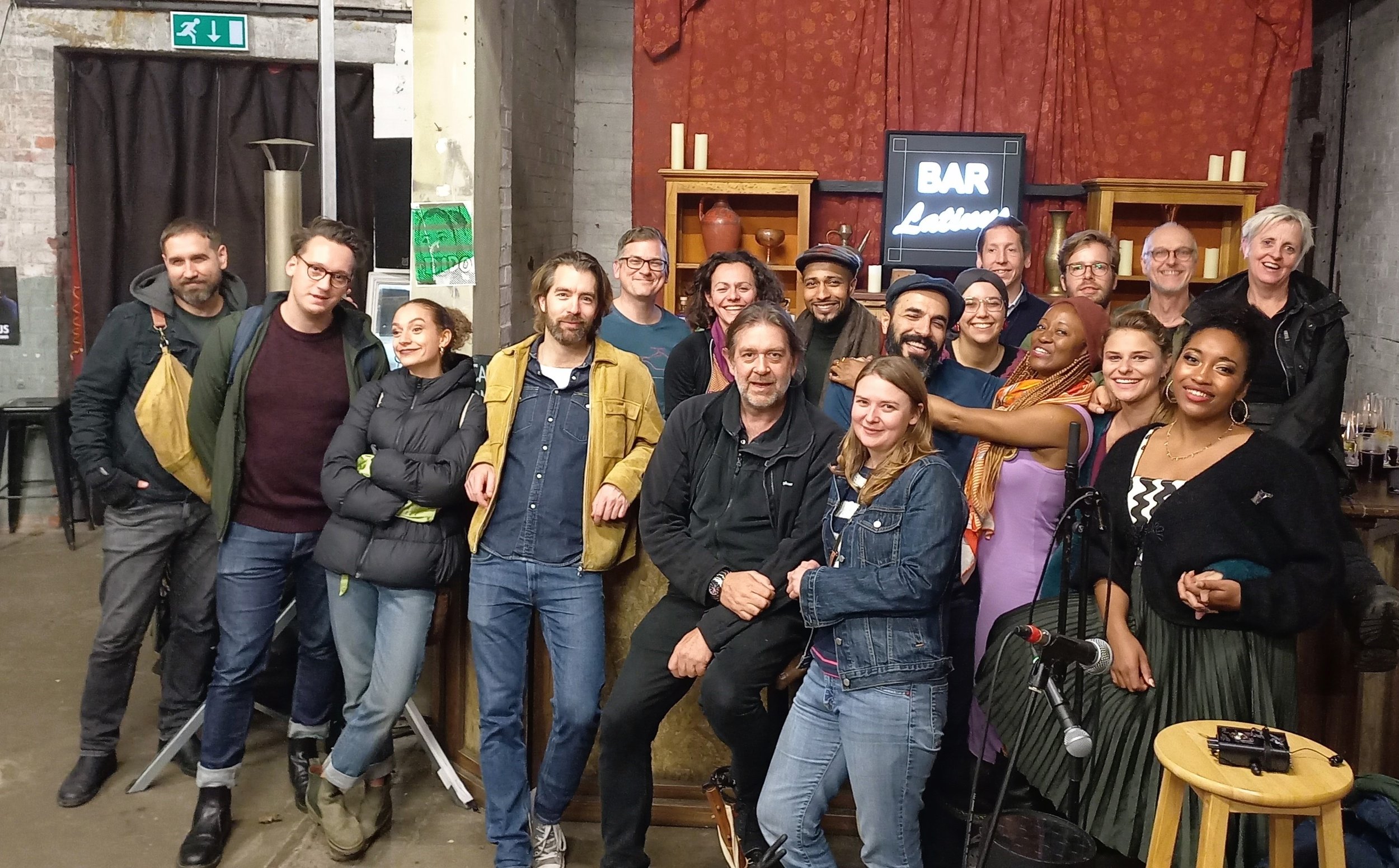Reflecting on Dido's Bar
Artistic director and Director of Dido's Bar, Josephine Burton, looks back on its 5 year journey from a coffee in Helsinki to a UK tour.
Priscille Grace in Dido’s Bar, Portsmouth. Photography by Port of Call Media.
The adventure that was Dido’s Bar drew to a close at the end of October, 5 years after I first met its composer and inspiration, Marouf Majidi. It has been an epic journey, thoroughly fitting for the retelling of our hero, Aeneas’ story. A five year long artistic journey has become the norm at Dash Arts – enough time to research, travel, workshop, fundraise, build partnerships, create and then produce new work. We joked about our ‘Five Year Plan’ from 2012-2017 exploring what it was like to live under the Soviet Union and its Aftermath and it was similar for our work across the Arabic World.
Early Development: 2017 - 2019
In November 2017, I was invited to Finland to begin research for EUTOPIA, a season of work exploring what it means to be European and what we mean by Europe. During that visit I met Marouf and have written elsewhere on our blog about our encounter and the amazing conversations I was privileged to have as a result.
Read more about how Josephine met Marouf
There are many reasons why it took 5 years to create Dido’s Bar. Significantly Dash doesn’t have a venue or money down the back of a sofa, so the main work to enable a project to happen is the building of intricate meaningful partnerships with venues, festivals, organisations and funders. These take time. To build trust and shared ownership. I’m so grateful to the many individuals who became excited about the idea and joined the project as it evolved. Covid obviously also added immense delays to its evolution.
But it takes time to cook a project from scratch. And crucially, it’s the longer process that makes the project deeper and richer.
Two years after meeting Marouf, in October 2019, I made it back to Finland to a music conference and took advantage of the visit to spend time in Marouf’s home in Helsinki, plotting. Back then we called the embryonic project, Out of Tune, paying tribute to the expression that Marouf had used when I had asked him how it was to move to Europe as a refugee. I had just made the link between the classical Aeneid and Marouf’s story, and talked about the project then as a ‘musical poem’.
Read more about Josephine’s visit to WOMEX, Helsinki in 2019
The Aeneid is often seen to be the great foundational myth of Europe. At its heart, though, it’s the story of a refugee, fleeing destruction and persecution, who travels to find a better life for themselves. With this at the core, I felt I could create a production that reframes the contemporary refugee experience as a timeless narrative.
A few months later, we met again in Scotland with the actor Ammar Haj Ahmed and playwright Chino Odimba, to plot more. It was in Scotland that we found a way to merge Aeneas and Marouf’s stories – moving the epic story into a more contemporary world, of music clubs filled with artists trying to build careers, and a clash of musical styles. The project became Dido’s Bar. And most importantly we relocated Dido’s Bar – Aeneas’ halfway stop on his journey – from North Africa to the outskirts of town.
Read more about the Cove Park residency in Scotland
Listen to our podcast episode about The Aeneid on Spotify
Scripts, Characters & Music: 2020 - 2021
Next, I sought a writer who could join Marouf and I in building this world of Dido’s Bar – a world of music and drama. The wonderful Hattie Naylor joined us and we were all set to spend a week in Finland in Summer 2020 developing it together. But Covid postponed everything. Instead, we zoomed. A lot. And in autumn 2020 we managed a residency in London, with some fabulous actor musicians. Marouf and I were able to be there in person and Hattie joined us on zoom.
In London, we started to play with the world of Dido’s Bar. Inspired by our work creating installations without fourth walls where our audience is part of the world, Residences like The Dash Arts Dacha, where we cooked, brought plays to life, participated in a music jams and danced late night into the night, I wanted to do something similar with our music club.
I was keen that once our audience entered Dido’s Bar, all the drama and action should unfold in the space. Any drama needed to take place in the venue without a fourth wall. A quiet conversation between two characters, which needed privacy in order to enable intimacy or conflict, still had to happen in the bar, surrounded by the audiences. It took us all that time to understand this and how the atmosphere, music, direction and writing could support this vision. Whilst we wrote quite a bit of what we thought was Act 2, looking back now on that first week together, I feel that this bigger existential idea was the most significant bit of learning we took from our week together. That and Smoky Nights – which emerged pretty much on that first day! Smoky Nights is the song that opens both our first and second act and Dido’s Bar’s signature song. You can hear some clips in our short Highlights film.
Hattie was very keen that we found a way to have a little bit of distance in our show. She wanted to find a way to tell the bigger picture so that our characters could live in Dido’s Bar and not have to explain where they had come from, or what had happened in a more didactic style.
We thought that the owners of Dido’s Bar, Venus and Juno, might offer an answer for this. Venus and Juno, our mortal bar owners, could also be immortal narrators. We spent a few days in May 2021 exploring these wonderful terrifying characters with Laura Hanna and Nandi Bhebhe. I had fun working with them as they tore off their mortal petty skins and became all powerful puppeteers. Hattie wrote some amazing text for the Goddesses to see into past and future, and crucially beyond the world of the Bar. I also learnt that week what an amazing asset they were in the bar as hostesses. I realised that it was our Goddesses that would greet the audience as they arrived, welcoming them into Dido’s Bar and building the world. Juno and Venus could make audiences feel they were part of the performance. We shared some material with invited audiences during those few days and learnt so much from interactions with the actors and their brilliant feedback. So much of the banter and playfulness from that week was carried through into our final show.
Hattie, Marouf and I finally made it to Finland, a year later in July 2021, supported by the Meidan Festivaali and Global Art Point. It was the first time the three of us had gathered in person together. It was a truly special creative and productive time. We wrote much of the first act that week – learning how to drive the story through the songs as well as the dialogue, and how we underscore the dialogue with the band, creating a conceit of intimacy between characters. We could create an environment where the characters could believe that their conversation was not being overhead as the audience surrounding them were supposedly watching the band whilst we simultaneously balanced audio levels to ensure that the music didn’t compete with the spoken dialogue. It was also during this week that through Samira Brahmia, a French Algerian singer who brought such a profoundly musically moving and Maghrebi-infused reading of Dido, a refugee from Tyre now based in Carthage, that we understood our eponymous heroine. As Hattie wrote beautifully in our blog at the time, when we shared the material at the end of the week, our audience was in tears. Our production was going to work.
Read Hattie’s reflections on the R&D in Finland.
Wonderfully that summer, our UK producing partnerships really came together – Royal Docks, Journeys Festival and Oxford Contemporary Music committed to supporting and hosting our tour across England and we received significant funding from the Arts Council to support it.
In October 2021, we were privileged to spend a day in person reading and hearing all the material, created over 3 different residences, together. Some of it worked beautifully. A great deal didn’t feel quite right – the Act 2 songs and dialogue from deep Covid had a different energy from our Finnish summer by which time Hattie, Marouf and I had honed our working processes and understood the show better. There was more work needed in order to have a full holistic script and score, and I felt we’d all benefit from another R&D week to understand the second half together before Hattie and Marouf completed their writing processes.
“Thank you for all [Dash Arts] and OCM have done for us, and most importantly for retelling powerful stories that arguably matter now more than ever” - Asylum Welcome
Casting & Rehearsals: 2022
Wonderfully, our producer Charlie Bunker magicked a residency at The Poly in Falmouth in May 2022.
Marouf, Hattie and I were joined by Riku Kantola and Tuukka Leppänen (who had been with us in Finland) and Georgina White. Tuukka, a Finnish actor, helped us to understand Turnus, the local boy whom Aeneas needs to ‘defeat’ in order to build a future for himself. Marouf was relocated to Finland by the UNHCR – Finland is to Marouf what Italia was to Aeneas. It made sense that the local boy was Finnish. Through Tuukka and our R&D process, Turnus became a folk musician, interested in exploring national identity through local music. Tuukka translated Hattie’s lyrics into Finnish and collectively Marouf, Riku and Tuukka started to create music inspired by Finnish folk songs.
Falmouth offered us another incredibly productive few days of writing songs and text. Through the precious time together talking, exploring scenes together, writing, learning and honing songs, we understood how to manage the drama of the second half of the show and to build it to its climax. We lost a few characters from the original story but gained Matina – a morphing of Virgil’s two original characters Amata and Lavinia – who added a little more complexity and female agency to our show.
Read more about the team’s time in Falmouth
Hattie and Marouf then proceeded to create a version of the script and score for us to work with in the rehearsal room in August 2022 where the show truly came to life. The cast breathed our characters to life. Aeneas became a drummer because Lahcen is a percussionist, Juno could duet with Matina on sax as she played the saxophone.
And the band made our show a reality. They were in the room throughout the whole rehearsal process – ensuring that we never forgot that Dido’s Bar was set in a music club and music was at the show’s heart. But crucially, MD Ben worked with Marouf and the rest of the band to create the underscores that enabled the dialogue to breathe and be heard. It was a truly collaborative, cross disciplinary process.
The FInal Product: Autumn 2022
It was incredibly special walking through the Tate and Lyle Factory to enter our London home for the first time in September 2022. I’d visited it first with Royal Docks in Spring 2021 when the ceiling was full of roosting pigeons and floor was still sticky with sugar and pigeon poo. Eighteen months later it became a music club. It was a gorgeous characterful space, absolutely realizing the sense of Dido’s Bar as a remote place on the edge of town. And alongside our production, we were able to showcase some exceptional local artists from around Newham as guest artists during the interval which really embedded the work in the area.
Dido’s Bar was built to travel and so we also visited Manchester, Leicester, Portsmouth and Oxford as part of the production. And each time, the piece responded to the space. In Manchester, we played in a jazz club, in Leicester, an old theatre, Portsmouth a brewery and Oxford a warehouse.
The show continued to evolve as it travelled. We’d rehearsed the production in quite a modular way. Bryan our designer and I named particular locations where scenes happened after colours (the Red table / the Green Coach etc). So that when we got to a location– I was able to re-block a scene – pointing out the new location for the red or blue table. In Leicester where the space was smaller, we created a purple table which could stand in for scenes at both! The cast were amazingly flexible – fully embracing the constant re-blocking and re-imagining of scenes so that it could work for new sightlines or the physical relocation of the bar to a different part of the room. And for me – it was totally luxurious to continue to give notes and tweak the show – scenes often worked better when I needed to change the positioning of the performers and suddenly the action or emphasis landed entirely differently.
I learnt that our show worked better in the slightly smaller venues where the conversations could be more intimate, and the audience could be surrounded and immersed in the action. And the sound and clarity of the language was better in acoustically more sympathetic venues.
“The performance was absolutely amazing. A wonderful atmosphere, fantastic music and acting, excellent articulation of some of the issues faced by people in the asylum system, beautifully emotive, evocative and entertaining too.” - Leicester Audience Member
Hattie, Marouf and I never quite stopped finessing the work, seeking to understand it better and how therefore we might better share it. The pacing of the development and the collaboration between us meant that the story, score and casting were deeply integrated, influencing and enriching the other.
At each stop on the way, in Finland, London, Scotland and Cornwall and of course all those hours online or privately, we learnt something new about the show and learnt from each other. I was floored by Hattie’s ability to ‘kill off her babies’, parts of the script which she loved but we both recognized didn’t work anymore, and by Marouf’s unflappable patience and willingness to completely rewrite a song to work with new lyrics or an entire melody if it didn’t quite fit. It was a true work of love for the three of us – woven through with time, shared meals, laughter, saunas in Finland, cold sea dips in Falmouth, performances from us all on stage at different points and a lot of conversation. We were joined by so many amazing fellow travellers who shared our determination and belief in its power. And I had the privilege to see it touching our audiences too. I overheard a young person from a local Newham school reflecting to their friend as they left: ‘That was amazing. We should set up a classics society’ and in Leicester a UK-based Iraqi Kurdish refugee said to the cast ‘I saw my whole life through your theatre.’
Last week, I opened an email from Hattie in my inbox to see a rewritten version of the script for the next time we mount it! I’d do it all over again, in a heartbeat!
- Josephine

